A Close Look at Donald Trump's Cabinet
Everything you need to know about who the president has named to his administration, why so many of his picks are so controversial, and why they keep changing.
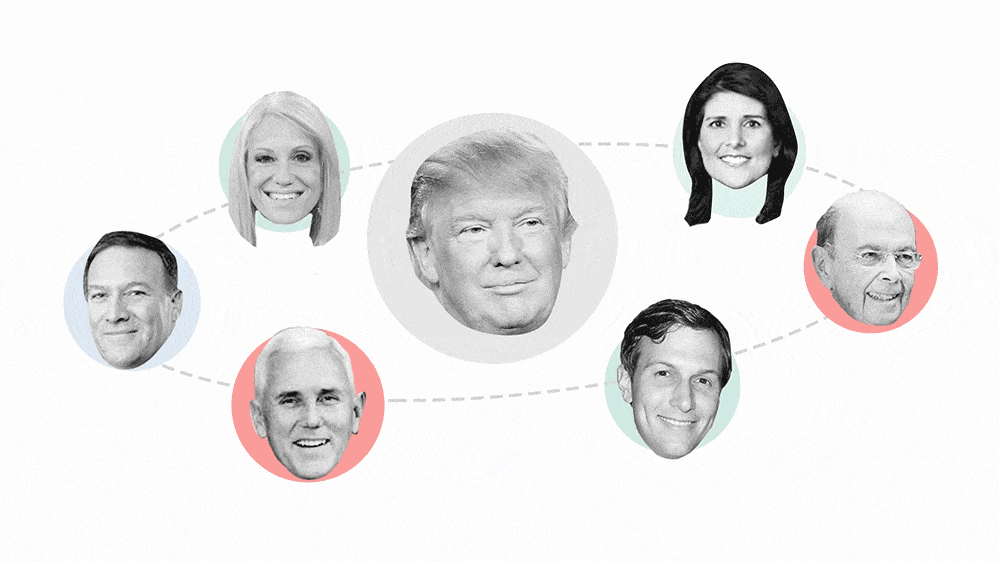
President-elect Donald Trump campaigned on a promise to "drain the swamp," i.e. rid Washington of the career politicians he perceives as corrupt. But many of the cabinet and cabinet-level appointments he's made since winning the election on November 8 are, to extend the metaphor, very swampy: a collection of veteran members of congress and people with close ties to the finance world, namely Goldman Sachs, the bank he often railed against during the campaign. The Chicago Tribune noted that the Trump administration might be the wealthiest in modern American history.
But it's not just millionaires and billionaires in his cabinet—Trump has, perhaps most notoriously, made an appointment with ties to the white supremacist "alt-right" movement to serve in positions that don't require confirmation from the Senate.
Trump's appointment process has also been infused with drama. Secretary of State, the marquee cabinet position that represents the United States around the world, was hotly contested, with multiple people vying openly for the spot: Rudy Giuliani, Mitt Romney, and David Patraeus among them. Trump even encouraged his own staffers to weigh in publicly, with his campaign manager KellyAnne Conway savaging Romney on Twitter and TV even as her boss takes him out for frogs' legs.
And on February 13, Trump's national security adviser and one of the president's staunchest supporters, Michael Flynn, resigned amid reports that he communicated with the Russian ambassador before Trump's inauguration about sanctions placed on the country. Two days later, Trump's pick for labor secretary, Andrew Puzder, withdrew his nomination amid a barrage of criticism.
Here, updated in real time, are all of President-elect Trump's revolving door of appointments, with handy breakdowns below:

Reince Priebus: Chief of Staff (UPDATE, 7/28: Replaced by John F. Kelly—see below)
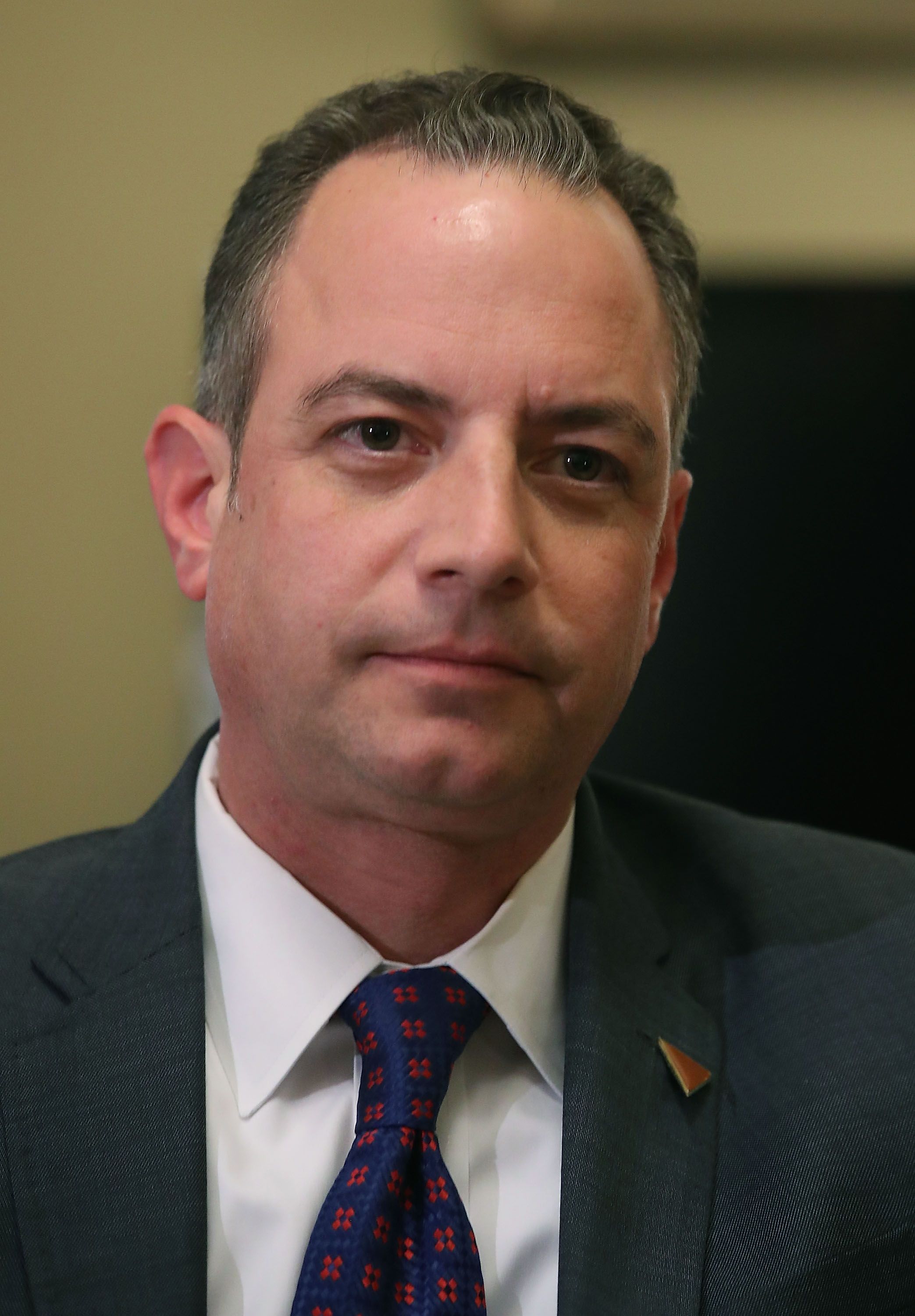
Background: Priebus, 44, is the current Chairman of the Republican National Committee. During the general election, Priebus stood by Trump even as other Republicans withdrew their support or openly criticized the candidate. Priebus has never held an elected office—he ran once and lost—having previously served as chairman of the Wisconsin Republican Party.
Why he's controversial: He's not really—especially when compared with the man Trump hired to serve alongside him, Steve Bannon (see below). But Priebus does lack government experience. While he's certainly cozy with Republican members of congress, he doesn't necessarily know how to run a government, which, considering Trump's own lack of experience at this level, could be problematic.
Get exclusive access to fashion and beauty trends, hot-off-the-press celebrity news, and more.
Gen. John F. Kelly: Secretary of Homeland Security (UPDATE, 7/28: Reassigned to White House chief of staff)
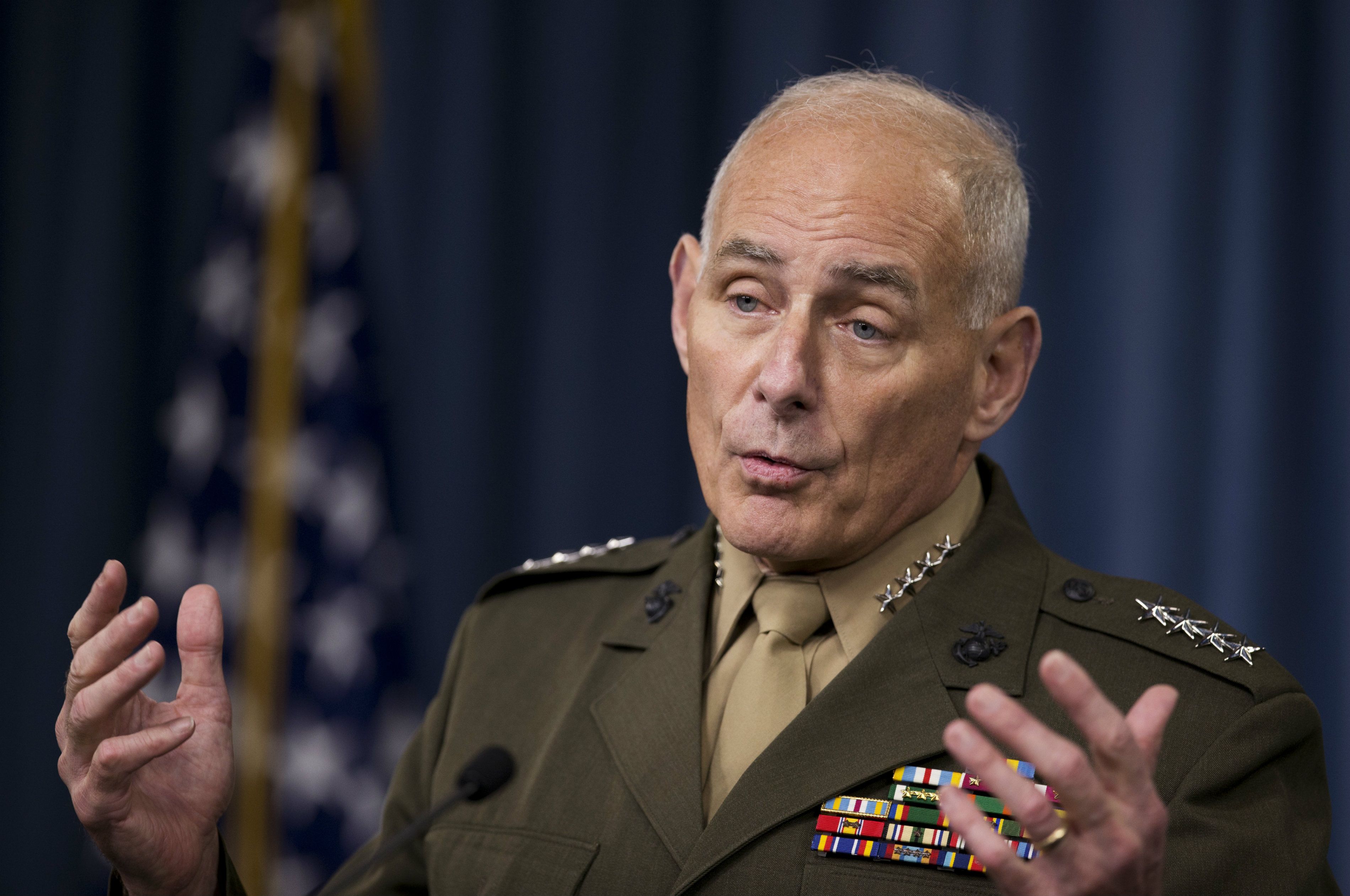
Responsibilities: The chief of staff is the highest-ranking employee in the White House and, according toThe New York Times Magazine, "arguably the most grueling job in Washington." Although the job varies from president to president, the chief of staff usually manages White House staff, oversees the president's schedule, and acts as the president's gatekeeper—deciding who gets face time with the commander in chief. This position does not require Senate approval.
Background: Kelly, 66, spent 40 years in the military, rising to general in the U.S. Marine Corps. He served three tours in Iraq, where he led troops into intense battle, according to The New York Times. The Boston native spent four years as the head of U.S. Southern Command, which oversees military operations in the Caribbean and Central and South America. He retired in February 2016.
Kelly also has the unfortunate distinction of being the highest-ranking military official to lose a son or daughter to combat. His son, 2nd Lt. Robert Kelly, died in Afghanistan in 2010 while leading a platoon of troops.
Although he rarely discusses the death of his son publicly, Kelly alluded to his loss during a 2013 speech at a memorial for Marines and sailors killed in Afghanistan. "From the bottom of my own broken heart, I'm sorry," he said.
Why he's controversial: The choice of Kelly continues Trump's pattern of surrounding himself with generals, which, according to The Washington Post, has some critics concerned that the president-elect is relying too much on former military brass.
Kelly has also drawn criticism for his remarks about allowing women into combat roles. Doing so, he said, might force the military to lower its standards. "There will be great pressure, whether it's 12 months from now, four years from now, because the question will be asked whether we've let women into these other roles, why aren't they staying in those other roles?" he told reporters in January 2016, a month before he retired from the military. "If we don't change standards, it will be very, very difficult to have any numbers—any real numbers—come into the infantry, or the Rangers or the SEALs, but that's their business."
Sonny Perdue: Secretary of Agriculture (CONFIRMED)
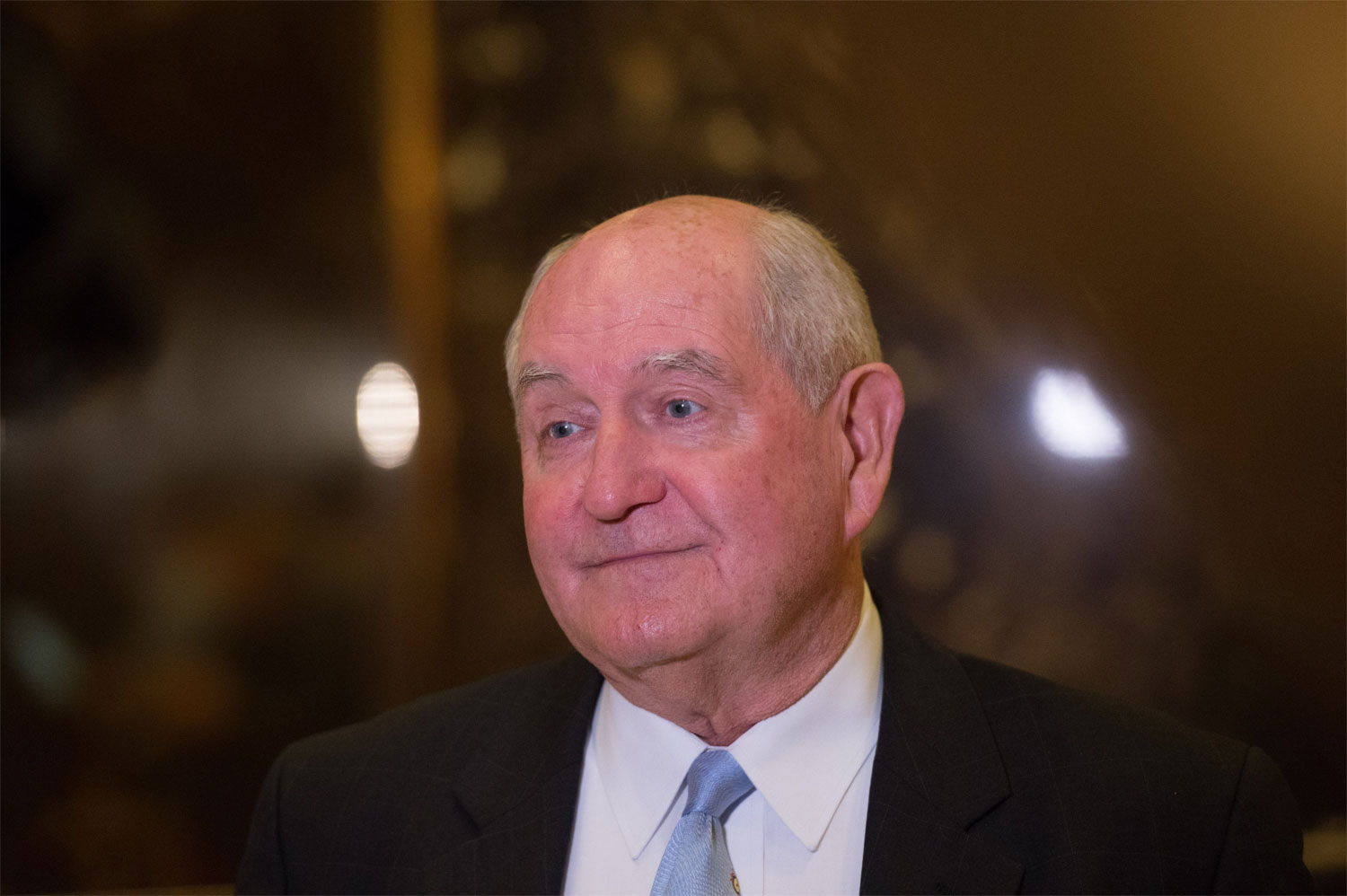
Responsibilities: The secretary of agriculture oversees one of the nation's largest departments, with an annual budget north of $150 million. It touches nearly all aspects of food in America, from insuring farmers' crops and inspecting meat-processing plants to writing dietary guidelines and managing the food stamp program. This position requires Senate confirmation.
Background: Perdue, 70, was a state senator in Georgia in the 1990s and served as governor from 2003 until 2011, switching his party allegiance from Democrat to Republican shortly before he was elected. He was Georgia's first Republican governor in 130 years, according to Bloomberg.
In 2007, Perdue led hundreds of people in prayer outside the capitol building in the hopes of summoning rain amid a crippling drought.
Perdue, a former veterinarian who grew up on a farm, spent much of his professional life in the agriculture business, according to The New York Times. After the governorship, he founded Perdue Partners, a company that trades Americans goods (including food ingredients) across the globe. He also served on the Trump campaign's agricultural advisory committee.
Perdue is not related to the family that owns the chicken producing company Perdue Farms, but his cousin, David Perdue, is a U.S. senator from Georgia who is a staunch Trump supporter.
Why he's controversial: This is an important job for the Trump administration. Farm revenues have slumped lately because of record-breaking crop hauls, creating a ripple effect across the agricultural industry, according to The Wall Street Journal. Plus, many of Trump's supporters come from the nation's top farming states, where they tend to support free trade—farmers rely on overseas buyers of their products—which Trump has blasted during his campaign.
Meanwhile, environmental activities and advocates for small farms slammed Perdue. "It's certainly hard to imagine that a former fertilizer salesman will tackle the unregulated farm pollution that poisons our drinking water, turns Lake Erie green, and fouls the Chesapeake Bay and the Gulf of Mexico," Scott Faber, senior vice president of government affairs at EWG, an environmental research group, told The New York Times.
"Given Perdue's position with a global agribusiness trading company and his actions as governor, we are concerned that Perdue will use his position at the USDA to prioritize the profits of big agribusiness and trade over the interests of American farmers, workers and consumers," Kari Hamerschlag, a deputy director with Washington-based Friends of the Earth, said in a statement.
Rick Perry: Secretary of Energy (CONFIRMED)
Responsibilities: The secretary of energy develops and implements policies related to nuclear power, fossil fuels, and alternative energy sources. The department is also responsible for managing the country's nuclear weapons. In fact, about 60 percent of its budgets goes to the National Nuclear Security Administration, according to The New York Times. This position requires Senate confirmation.
Background: Perry, 66, served as governor of Texas from 2000 to 2015 and as the state's agriculture commissioner before that. He ran unsuccessfully for president during the 2012 and 2016 elections (although he dropped out in 2015). Perry was a harsh critic of Trump and even called him a "cancer to conservatism," but ultimately campaigned for him.
In the fall of 2016, he competed on ABC's Dancing with the Stars.
Why he's controversial: During a Republican debate in 2012, Perry was asked which federal departments he'd eliminate. He intended to say Energy—the very department he's now tapped to run—but could not remember. The gaff effectively ended his presidential bid.
Perry lacks the experience of previous energy secretaries. The two people who've led the Department of Energy during the Obama administration are both physicists—one of whom won a Nobel Prize—largely because so much of the department's work is around nuclear weapons, according to The New York Times.
For his part, Perry will likely shift the department away from renewable energy and toward oil and other fossil fuels that he championed as Texas governor.
He also sits on the corporate board for Energy Transfer Partners, the parent company of Dakota Access, which wants to build part of an oil pipeline under a Missouri River reservoir that provides drinking water to the Standing Rock Indian Reservation.
Ben Carson: Secretary of Housing and Urban Development (CONFIRMED)
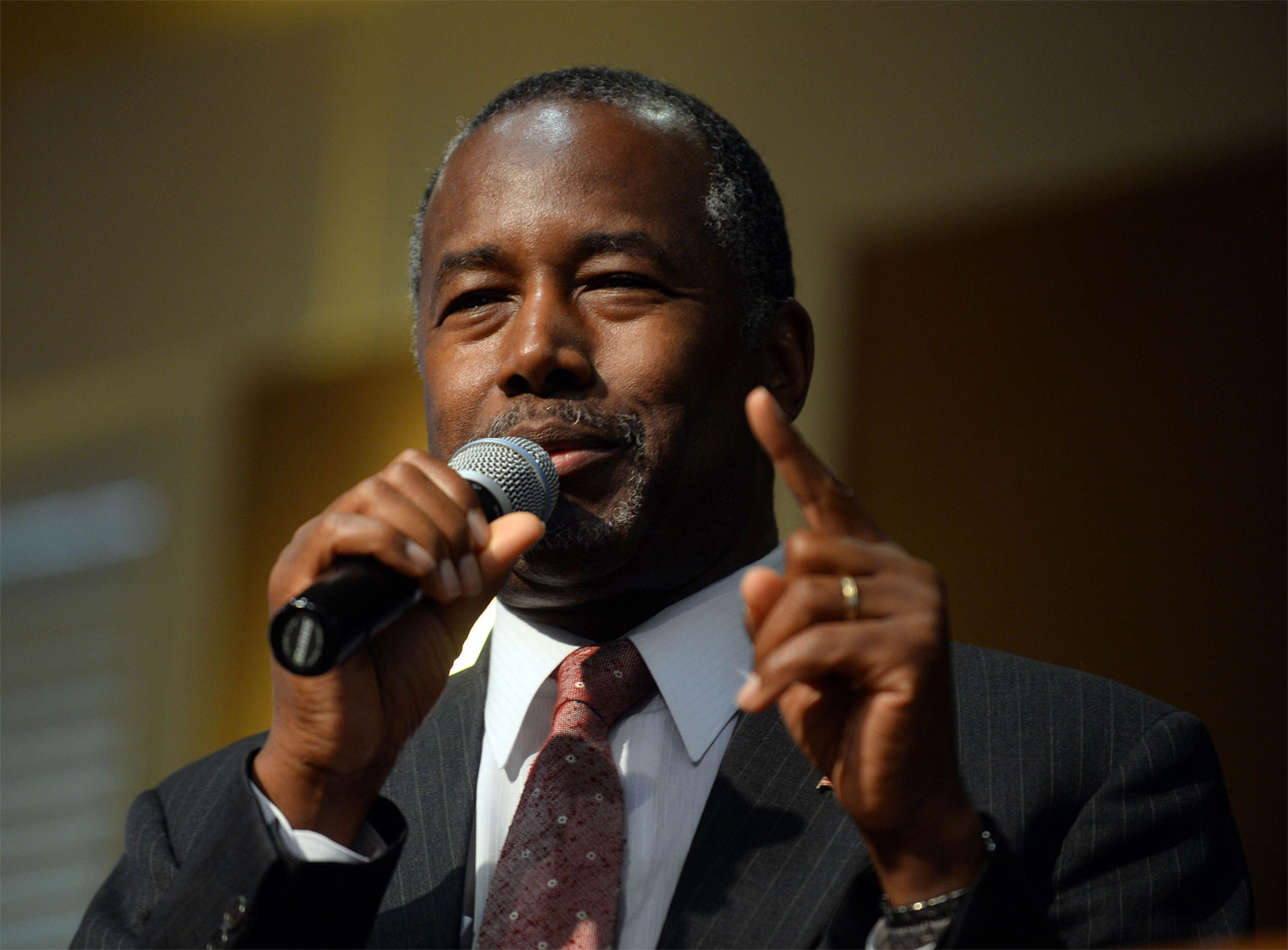
Responsibilities: The HUD secretary oversees federal programs designed to increase American homeownership, help homeowners avoid foreclosure, and provide access to affordable housing, including a voucher system for five million low-income families. This position requires Senate approval.
Background: Carson, 65, is most widely known for running for the Republican presidential nomination earlier in this campaign—a bid he dropped in March before throwing his support behind Trump.
Born into poverty in Detroit, Carson earned scholarships to Yale and the University of Michigan and, by the age of 33, was director of pediatric neurosurgery at Johns Hopkins Hospital, a role he held from 1984 until his retirement in 2013. Along the way, he's written six best-selling books, starting with an autobiography in 1992.
Carson surged onto the national political scene in 2013, when he gave a speech at the 2013 National Prayer Breakfast that was critical of President Obama—who was, according toThe Washington Post, standing a short distance away. He quickly became a fixture on Fox News, where he frequently slammed Obamacare.
During the Republican primary cycle, Trump viciously attacked Carson, at one point comparing him to a "child molester" because of his violent behavior as a child (none of which included actual child molestation). The pair reconciled, however, with Carson becoming one of Trump's earliest proponents.
Why he's controversial: Carson has no experience in government or in the field of housing and urban development. His sole qualification is that he grew up in public housing in Detroit. Carson even told a close friend he was reluctant to join Trump's administration because of his lack of experience, according to The Hill.
Carson has also criticized government programs meant to combat poverty because, as The New York Times notes, they've replaced church-based and other community efforts. "We the people have the responsibility to take care of the indigent in our society," he said at a Republican town hall-style event in February. "It's not the government's job."
Carson also opposes an Obama administration effort to improve housing integration. The Washington Post reviewed Carson's political commentary on housing policy and found it at odds with policies favored by minority groups like the NAACP to fight segregation in housing.
"With many qualified Republicans to choose from with deep knowledge of, and commitment to, affordable housing solutions for the poorest families, and with the housing crisis reaching new heights across the country, Dr. Carson's nomination to serve as HUD Secretary is surprising and concerning," Diane Yentel, president of the National Low Income Housing Coalition, said in a statement.
Ryan Zinke: Secretary of Interior (CONFIRMED)
Responsibilities: The Secretary of Interior oversees the nation's federal land, natural resources, and public waters, as well as manages relations with Native Americans. This position requires Senate confirmation.
Background: Zinke, 55, is a Republican member of the House of Representatives from Montana, a post he's held since 2015. He spent 23 years as a Navy SEAL—serving in hotspots like Iraq and Kosovo while earning two Bronze Stars—before entering state politics in Montana in 2008.
An avid outdoorsman who holds a geology degree from the University of Oregon, Zinke is a vocal advocate of keeping public lands in the hands of the government—an issue close to the hearts of most residents of Montana, where almost a third of the land is government controlled.Trump considered Rep. Cathy McMorris Rodgers, a Republican from Washington state, for the Interior job, but Trump's son, Donald Jr., who is an avid hunter, may have tipped the decision toward Zinke.
Why he's controversial: While Zinke wants the government to maintain control over public lands, he's also a proponent of drilling for oil and mining coal on that land. That's led environmental groups to slam Zinke's appointment.
"Zinke embodies the worst kind of magical thinking in Congress: that government welfare handouts can save dying coal companies and crumbling oil and gas giants," Greenpeace climate campaign specialist Diana Best said.
On climate change, Zinke has raised doubts, describing the overwhelming evidence behind it as "unsettled science" (although he's also said "something is going on with the climate").
And Zinke, like other members of Trump's cabinet, has spoken positively about Russian President Vladimir Putin, citing his annexation of Crimea and shadow invasion of Ukraine as signs of his strong leadership. (The U.S. has imposed sanctions on Russia over its moves in Crimea.)
Wilbur Ross: Commerce Secretary (CONFIRMED)
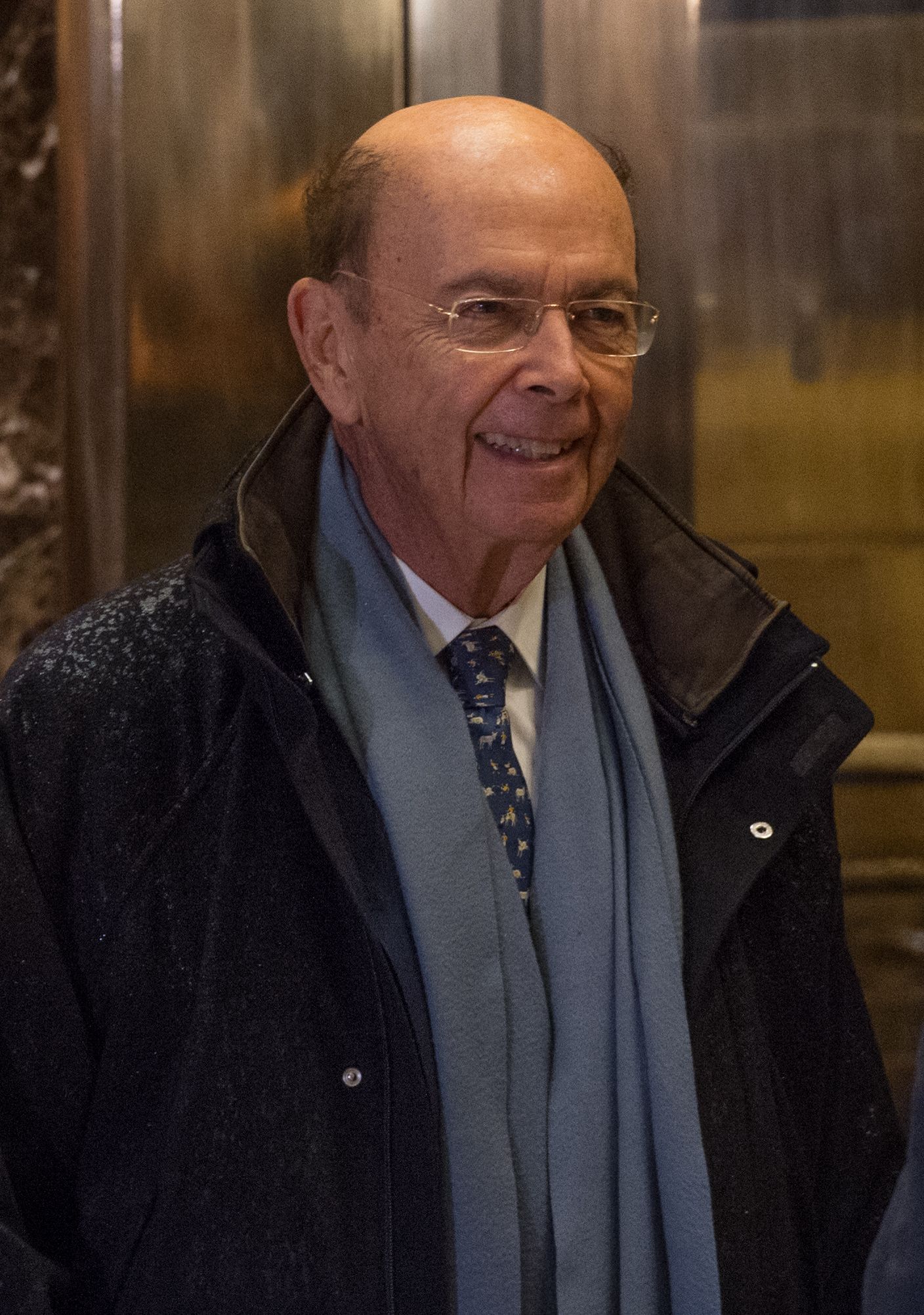
Responsibilities: The commerce secretary's job is to promote American business and industry, and it includes liaising with a wide array of government agencies like the U.S. census. This position requires Senate approval.
Background: Ross, 79, is a veteran private-equity investor whose wealth is estimated at $2.9 billion. He's known, according to USA Today, as the "king of bankruptcy," for his ability to buy troubled companies "on the cheap" and sell them for billions of dollars in profit. Ross will be key to Trump's plan to create jobs as well as push his agenda on trade, according to Bloomberg.
Why he's controversial: At least two of the companies he's bought have run into trouble. In 2001, for instance, he bought a number of coal companies, one of which experienced an explosion that killed 12 miners. Surviving family members sued Ross and others, claiming they ignored safety violations and put the workers at risk. Ross said at the time he was unaware of any safety concerns.
Democratic senators also raised questions during Ross's confirmation process about his ownership stake in a Cyprus bank that has ties to Russian elite, including Vladimir Putin. Just before the Senate voted to confirm Ross on February 27, Democratic Senator Bill Nelson of Florida said the White House decided to "sit on" Ross's written responses to some of the Democratic senator's questions despite Ross having told Sen. Nelson he wanted the responses released.
Lt. Gen. H.R. McMaster: National Security Advisor
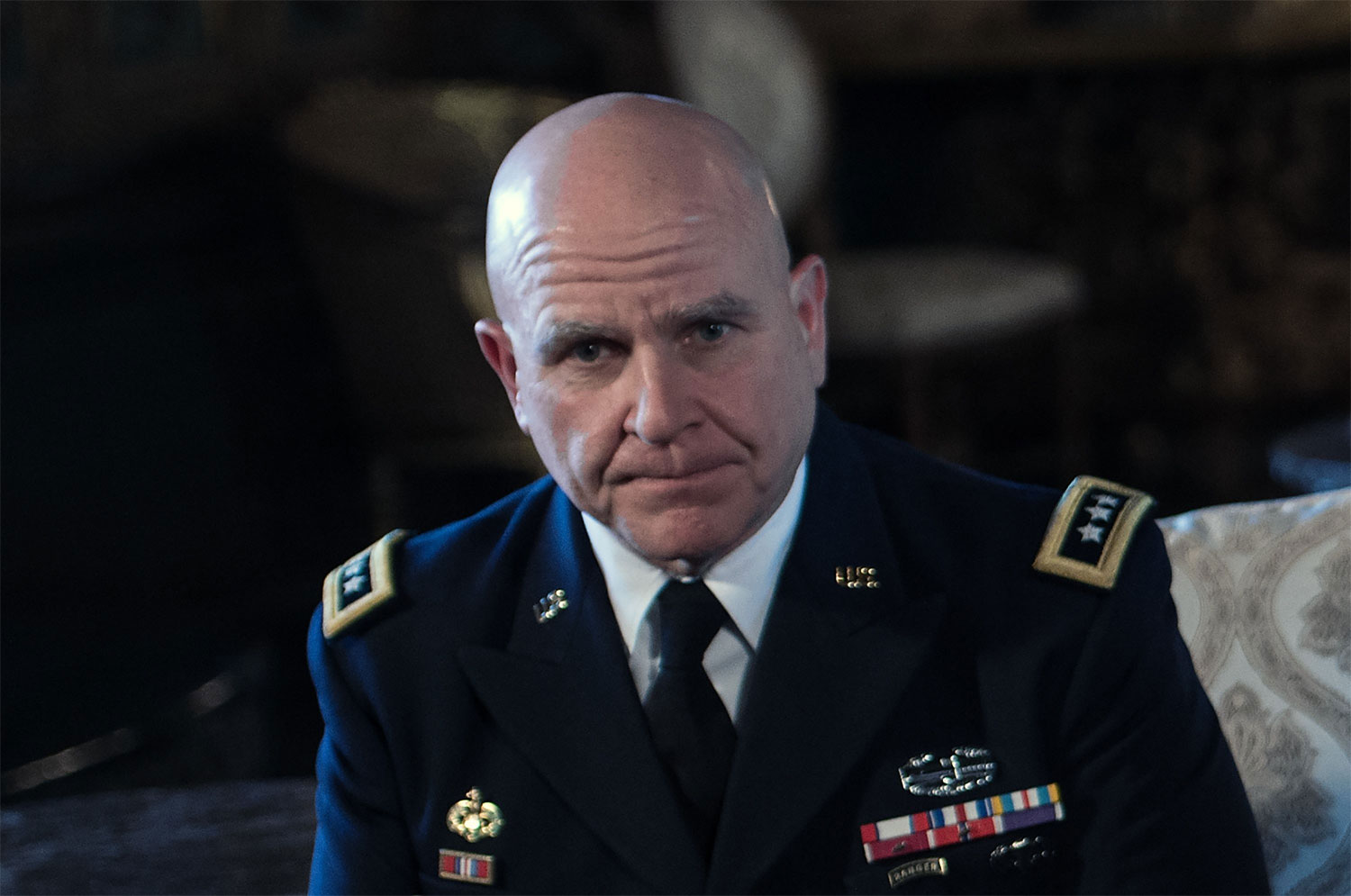
Responsibilities: The national security adviser is considered the president's top in-house counselor on matters of national security. The person in this role weighs in on policies from the departments of State and Defense. This position does not require Senate approval.
Background: McMaster, 54, is a lieutenant general is the Army. He is a widely respected battlefield commander who served in Iraq during both Gulf Wars. In 2005, while leading a 3,500-soldier brigade during the Iraq War, McMaster threw away the Bush administration strategy to pull back from cities and instead pushed his troops into Tal Afar, eventually retaking the city from insurgents, according to The Washington Post. His strategy was so successful that it became the model for U.S. forces in Iraq.
McMaster, who earned a doctorate in history, is also outspoken and known as a risk taker. It's not sat well with some of his superiors and slowed his rise through the ranks. He is currently working on Army doctrine and modernization, which The Washington Post referred to as a "backwater."
McMaster will not retire from the military, which is not unusual. Colin Powell remained on active duty while he served as President Reagan's national security advisor.
Why he's controversial: The military and intelligence communities are celebrating his appointment, so is Sen. John McCain, an outspoken critic of the Trump administration. McMaster is not an extremist like his predecessor, Mike Flynn, who held far-right views on Islam and seemed at the very least amenable to dangerous conspiracy theories. Unlike other military generals in Washington, however, McMaster has no experience in politics—right now it remains to be seen whether that's an asset or a liability.
Scott Pruitt: Head of the Environmental Protection Agency (CONFIRMED)
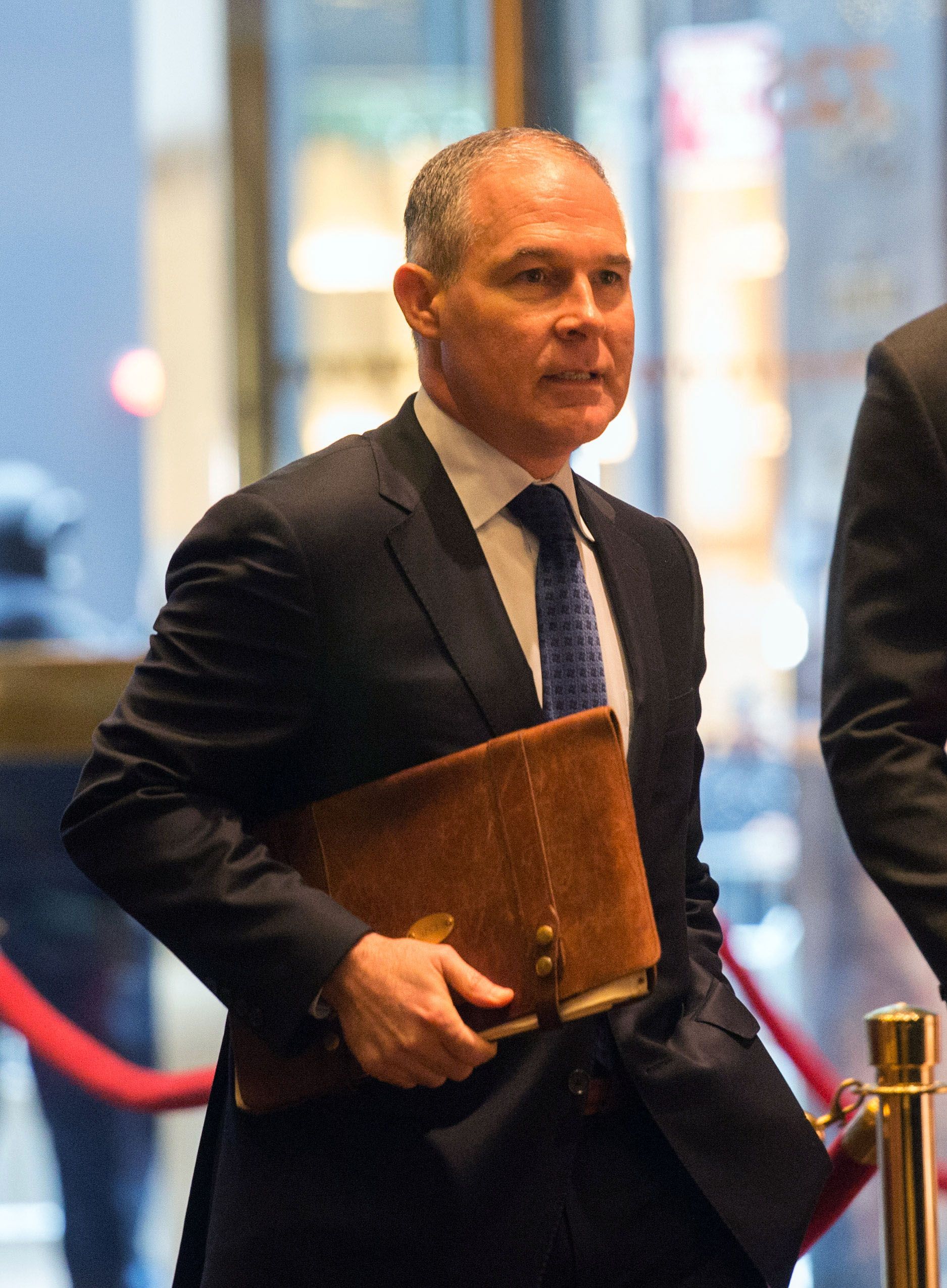
Responsibilities: The Environmental Protection Agency, or EPA, writes and carries out regulations passed by Congress to protect the environment as well as the health of American citizens. Although it's not a cabinet department, the EPA administrator is given cabinet rank. This position requires Senate approval.
Background: Pruitt, 48, is the attorney general of Oklahoma. He has been a booster of the fossil fuel industry, forging an alliance, The New York Times said, with some of the nation's top energy companies. Pruitt is also an outspoken critic of the EPA, deriding its "activist's agenda."
Why he's controversial: Despite being appointed to oversee the government's role in environmental protection (though perhaps not surprisingly, given what we already know about Trump's cabinet), Pruitt doesn't believe in global warming. He denies the overwhelming scientific evidence that the Earth's temperature is rising and that man-made carbon emissions are to blame.He's also currently suing the EPA. In fact, as attorney general of Oklahoma, he's repeatedly sued the EPA to roll back environmental regulations and public health protections.Pruitt's appointment looks like a sure sign that Trump aims to reverse many of the Obama administration's moves to combat climate change.
Alexander Acosta: Secretary of Labor
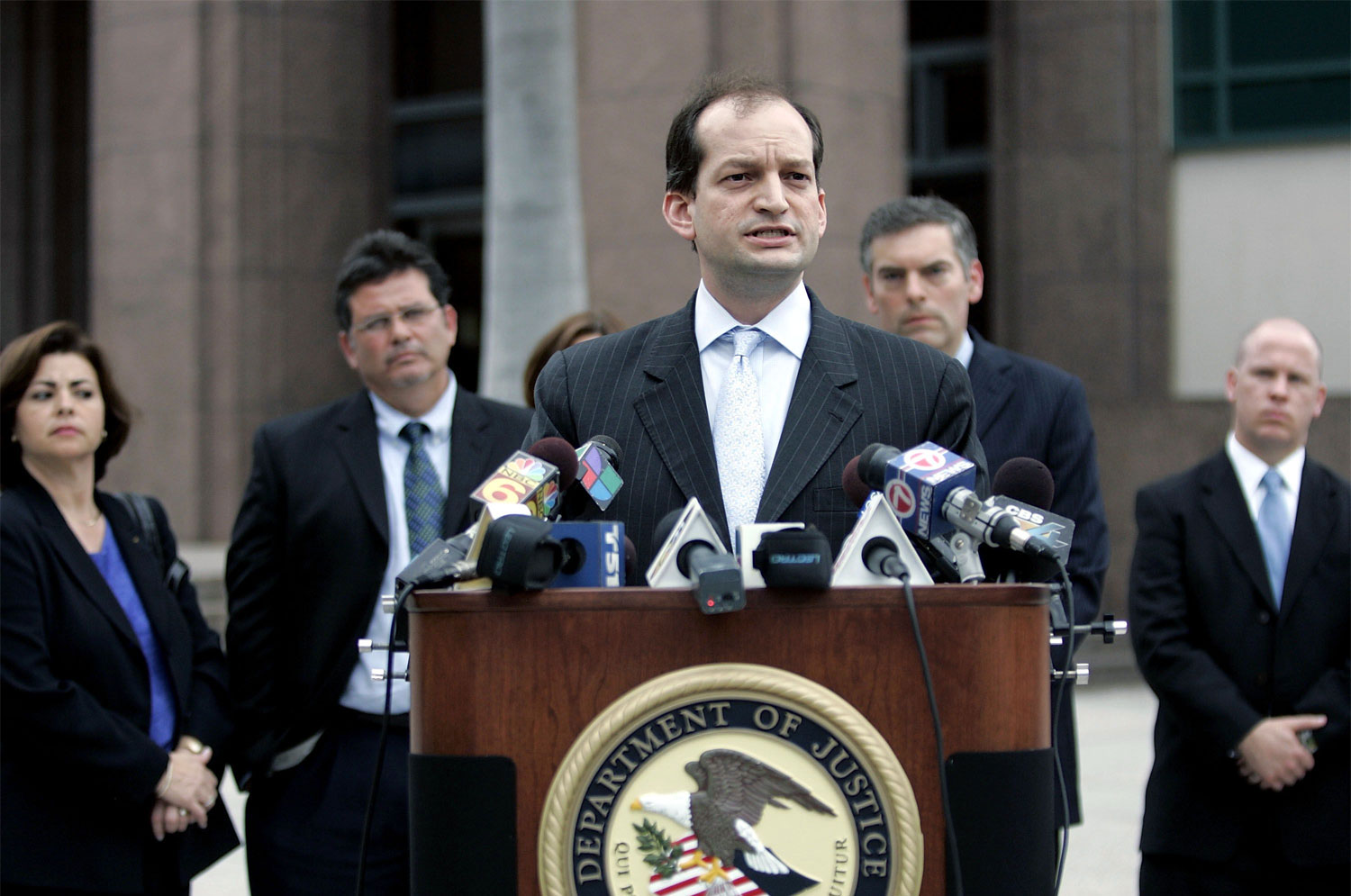
Responsibilities: The labor secretary enforces and proposes laws involving unions and the workplace, including safety conditions, hours and wages, and unemployment benefits. This position requires Senate approval.
Background: Acosta is the dean of Florida International University (FIU) law school, a role he's held since 2009. A Miami native and graduate of Harvard Law School, Acosta clerked for Supreme Court Justice Samuel Alito in 1994 and 1995 when Alito was an appeals court judge, according to his FIU bio. Then Acosta went on to work at the law firm Kirkland & Ellis, specializing in employment and labor issues. He also taught employment law at the George Mason University School of Law in Washington, D.C.
In 2002 and 2003, Acosta served on the National Labor Relations Board. Then President George W. Bush appointed him to the position, which was confirmed by the Senate. Acosta also worked as an assistant attorney general for the Department of Justice's Civil Right's Division and as the U.S. Attorney for the Southern District of Florida, NBC News reported.
Acosta, who is Cuban American, was the first hispanic to serve as assistant attorney general, according to his FIU bio. He also serves as the Chairman of U.S. Century Bank, the largest domestically-owned Hispanic community bank in Florida.
If confirmed by the Senate, Acosta would be the only Hispanic on Trump's cabinet.
Why he's so controversial: Thus far, it appears Acosta will not draw the level of scrutiny as fast-food executive Andrew Puzder, Trump's first choice for labor, who came under fire for his views on labor issues, his admission that he employed an undocumented immigrant as a housekeeper (or which he only recently paid back taxes), and his first wife's allegations that he abused her (which she later recanted). Acosta has been confirmed by the Senate on three different occasions for positions in the George W. Bush administration, President Trump said when he announced Acosta's nomination on February 16.
David Shulkin: Secretary of Veterans Affairs (CONFIRMED)
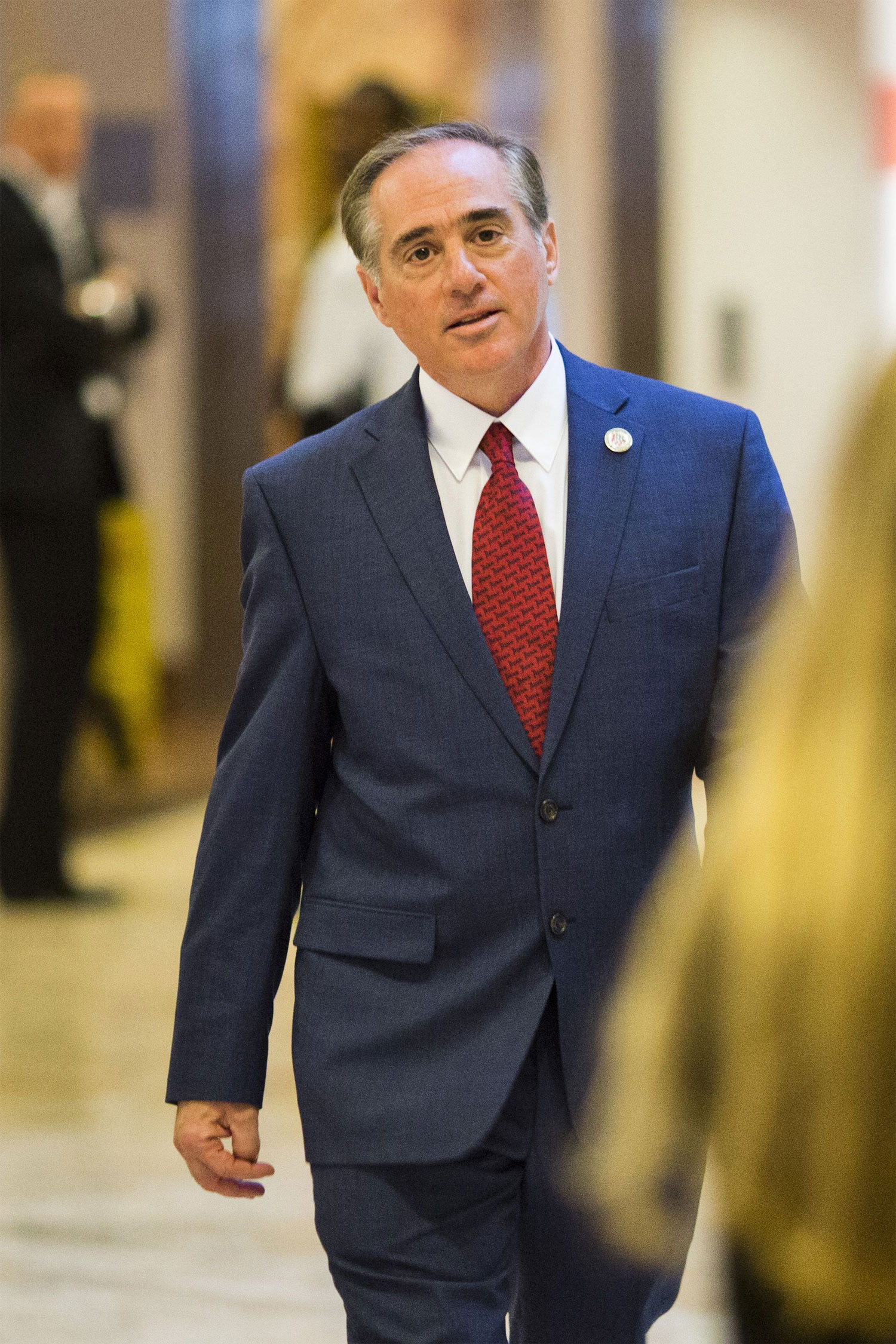
Responsibilities: The secretary of veterans affairs leads the sprawling Department of Veterans Affairs, which is responsible for providing health care services and benefits programs to veterans and their dependents. The Department also manages national veteran's cemeteries and memorials. This position requires Senate confirmation.
Background: Shulkin, who is a board certified physician, currently serves as the Under Secretary for Health in the Veterans Affair's office, a position appointed by President Obama. In his current role, Shulkin oversees more than 1,700 care centers in the U.S., according to CNN. That makes him responsible for the healthcare of nearly 8.8 million veterans, the Philadelphia Inquirer points out. Shulkin, who resigned from a $1.3 million a year job at Morristown Medical Center in New Jersey for his current VA role, was brought in to reinvent the department (and he took a more than $1 million pay cut to do it).
Why he's controversial: The person tapped to run the VA is usually a veteran, according to NPR. Shulkin is not. Veteran's care advocates lobbied Trump to keep the current VA Secretary Robert McDonald in his post, CNN reported. But Trump has promised to overhaul the VA—an effort supported by Democrats and Republicans alike, so it's not too big a surprise that Trump keps an Obama appointee for this role. "We think that this selection will be someone that, with time, will straighten it out," Trump said of Shulkin.
Jared Kushner: Senior Advisor to the President
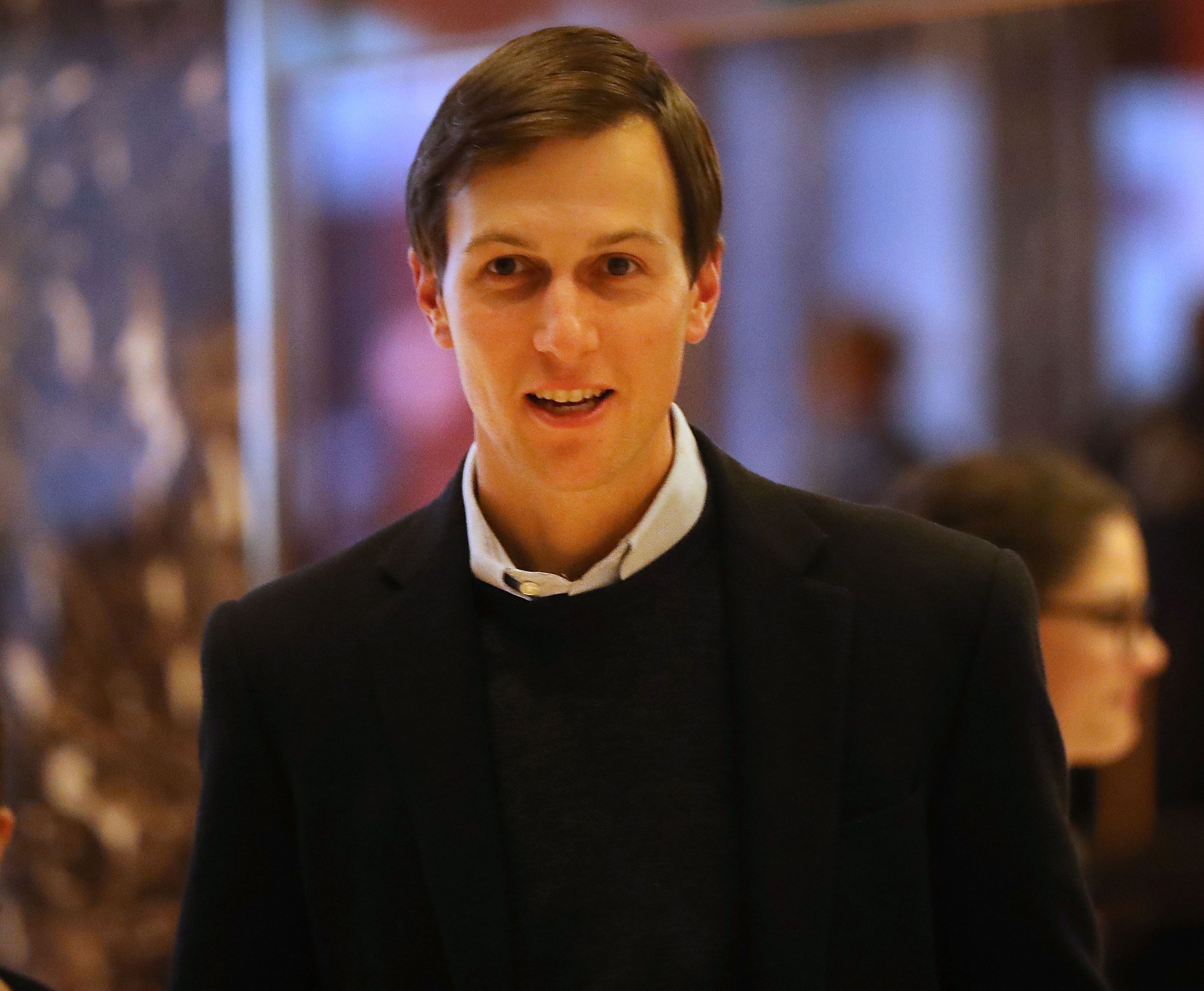
Responsibilities: The Trump transition team hasn't confirmed Kushner's appointment yet—multiple media outlets have reported it, citing transition officials—so right now his precise role is unclear. But during the presidential election, Kushner was Trump's closest advisor, "the last person he consulted before making major decisions," according to New York magazine.
Background: Kushner, 35, is Trump's son-in-law; he married Ivanka Trump in 2009 and together they have three children. Kushner is CEO of Kushner Companies, a real estate development firm headquartered in Manhattan, and owner of the digital media company the Observer, formerly The New York Observer newspaper. Kushner is a real estate scion, having taken over the family business from his father Charles, who served nearly a year in prison for campaign-finance violations. Kushner became Trump's informal-yet-closest advisor during the presidential election, traveling with then-candidate Trump during his campaign.
Why he's controversial: It's still unclear whether Kushner can actually take a job in his father-in-law's administration at all. A federal anti-nepotism law, established in 1967, prohibits a public official from giving family members jobs in "the agency" he or she oversees. Trump transition officials argue the White House is not an agency, according to NPR, thus it's immune.
Kushner also lacks experience in politics. Apart from advising his father-in-law's campaign, Kushner's job history consists of real estate, media, and philanthropy. His business entanglements and the potential conflicts of interest they pose could also be problematic.
Dan Coats: National Intelligence Director
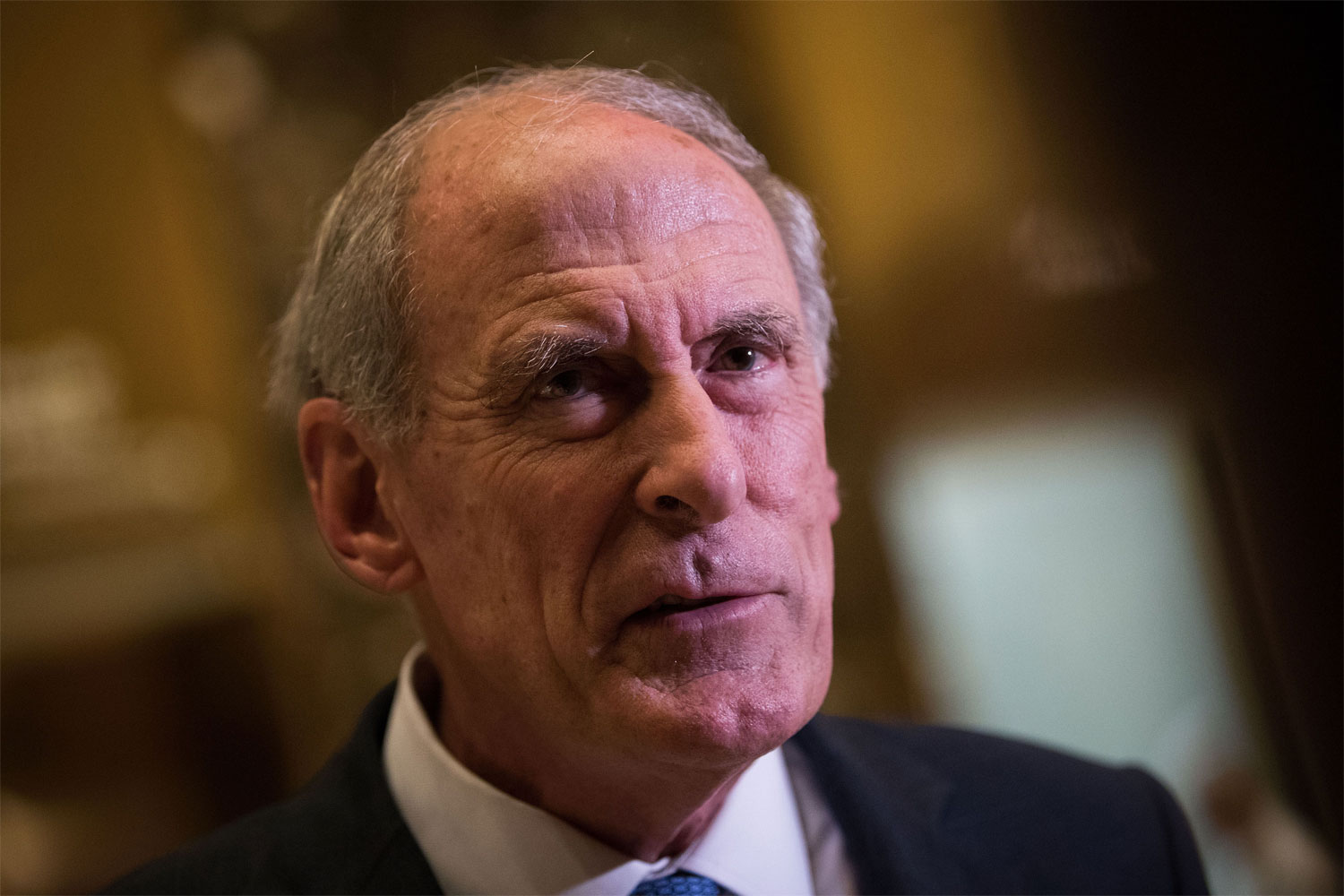
Responsibilities: The Director of National Intelligence is the top intelligence official in the federal government and is the head of the Intelligence Community (IC). This position oversees 16 agencies that gather intelligence on threats to national security, including the Central Intelligence Agency, Air Force Intelligence, Army Intelligence, and the Department of Homeland Security. Coats will be a principle adviser to the president on intelligence and national security matters. This position requires Senate confirmation.
Background: Coats, 73, is a retired Republican Senator from Indiana. He served two terms in the Senate and was a member of the Senate Intelligence Committee. In addition, Coats served four terms in the House of Representatives and was an ambassador to Germany during George W. Bush's presidency. Coats is considered a mild-manner conservative, according to The New York Times. He retired from the Senate earlier this month.
Why he's controversial: Coats isn't nearly as controversial as some of Trump's other picks to fill out intelligence jobs, like Mike Pompeo, his choice for CIA director, who supports torture and widespread government surveillance. But Coats' role might be fraught with controversy as Trump—who has repeatedly dismissed U.S. intelligence agencies' conclusion that Russia hacked U.S. institutions to influence the election in his favor—looks to possibly make changes to the nation's intelligence community.
Coats and Trump differ regarding their personal and political relationships with Russia. Coats was one of six members of Congress banned from entering Russia after pushing the Obama administration to put sanctions on Russia for the annexation of Crimea, according to the Indianapolis Star. "As far as I know, I'm still banned from Russia," Coats said in December. "I've been there before and I don't need to go back. Under this current Russian president, I'm not sure they're willing to lift that."
Kellyanne Conway: Counselor to the President
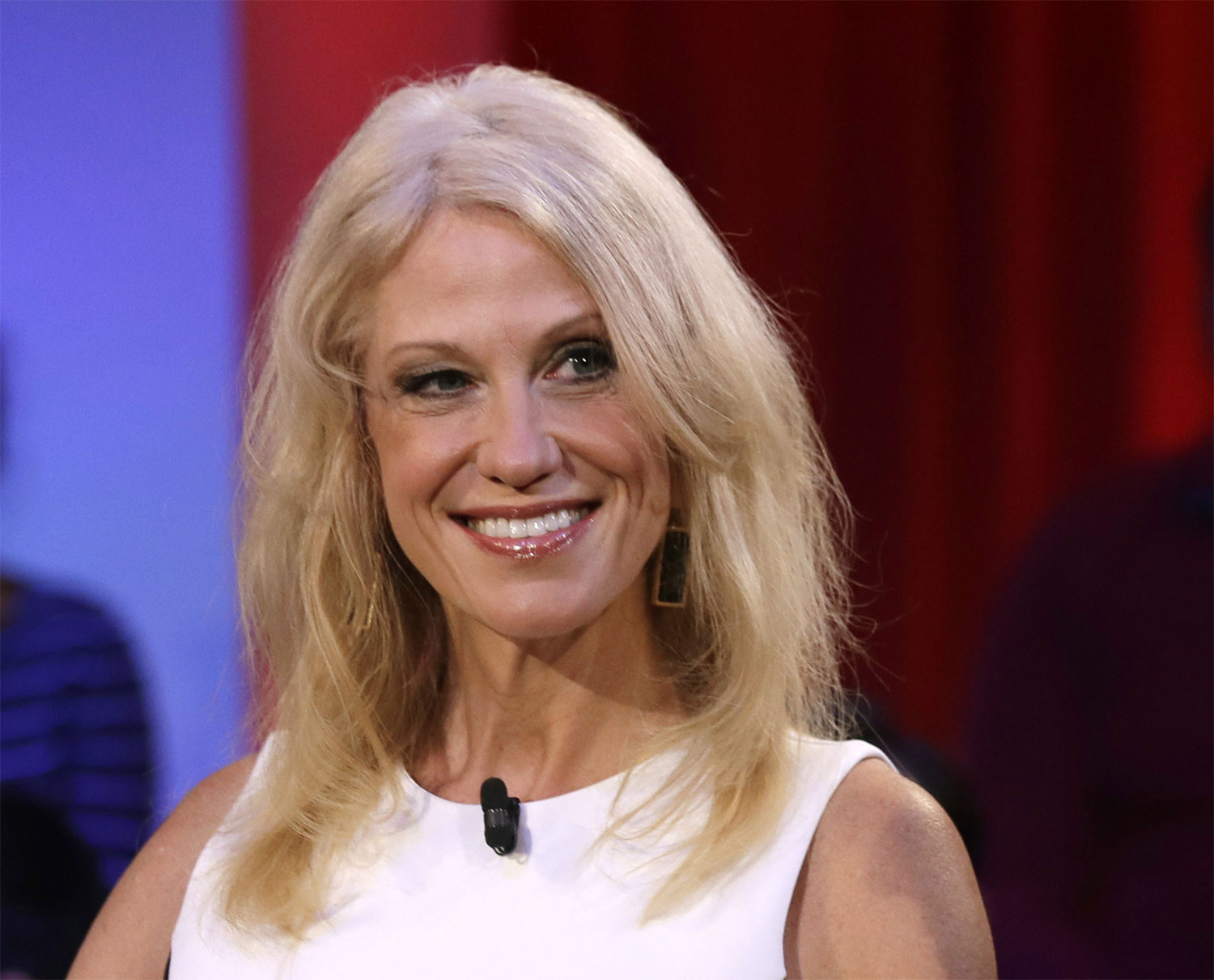
Responsibilities: Part of the senior leadership team in the West Wing, the counselor to the president will be responsible for carrying out the president's priorities and communicating his message, according to a statement from Trump. It makes Conway the highest-ranking woman in Trump's White House. This position does not require Senate confirmation.
Background: Conway, 49, is a veteran political operative, having spent the last three decades advising Republicans on how to appeal to female voters. Clients of her firm—The Polling Company, which she started in 1995—have included Newt Gingrich, Mike Pence, the National Rifle Association, and Todd Akin, the Republican representative from Missouri who said in a TV interview in 2012: "If it's a legitimate rape, the female body has ways to try to shut that whole thing down."
Conway became Trump's campaign manager in August, appearing frequently on TV to defend him and earning her the nickname "Trump whisperer" (and a biting Saturday Night Live impersonation by Kate McKinnon). After the campaign's stunning election victory, Trump reportedly asked Conway to serve as his press secretary in the White House, but she held out for a position that puts her in league with Trump's other West Winger advisors, Reince Priebus (former chief of staff, since replaced with John F. Kelly) and Steven Bannon (breakdown below).
Conway, a married mother of four who currently lives in New Jersey, publicly wrestled with the decision to take a job in the White House, saying recently that it was a "bad idea, bad idea, bad idea, bad idea for mom going inside" the White House.
Why she's controversial: Journalists, Republicans, and even some Democrats credited Conway for, as the Times put it, "smoothing out" some of Trump's rougher edges through her many TV appearances. But she's also earned the label "Enabler in Chief" for playing down his worst habits and excusing his bad behavior. After the Access Hollywood tape went public—in which Trump in 2005 bragged about sexually assaulting women—Conway took to the airwaves defending her boss. She called his remarks "disgusting and offensive" but tried to shift the spotlight to unnamed members of congress who, she claimed, were guilty of sexual harassment.
More recently, her comment about the White House not being a place for moms stirred up controversy on both sides of the aisle.
Mick Mulvaney: Budget Director (CONFIRMED)
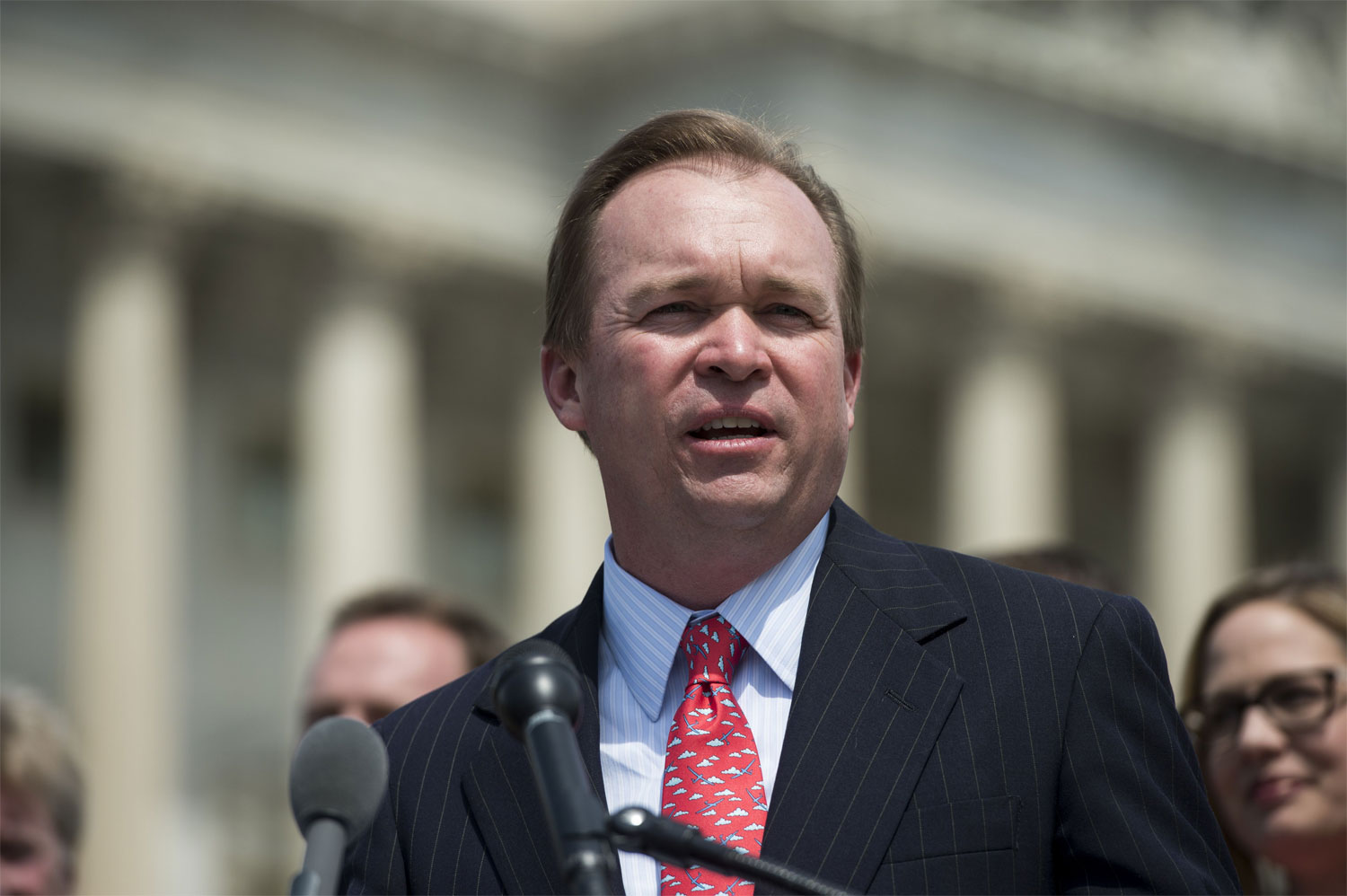
Responsibilities: The office of management and budget assists with preparing the annual federal budget and oversees its administration in federal agencies. One of Mulvaney's chief duties will be, according to theWashington Post, "overseeing the most dramatic overhaul of the nation's tax code since President Ronald Reagan." This position requires Senate confirmation.
Background: Mulvaney, 49, is a four-time House representative for the state of South Carolina. A graduate of Georgetown University's School of Foreign Service, UNC Chapel Hill's law school, and Harvard Business School's Owner/President Management program, he had a varied career before turning to politics: Mulvaney started his own law firm, ran the family real estate business, started a home-building company, and owned a restaurant before running for office.
Elected in the tea-party surge of 2010, Mulvaney quickly established himself as one of Congress's most fiscally conservative lawmakers, theWashington Post reports. He helped found the "hard-right" House Freedom Caucus, which, according to Fox News, is "the most conservative and raucus bunch in the chamber." They pushed for House speaker John Boehner's resignation in 2014 over, among other things, his unwillingness to take a harder line on defunding Planned Parenthood.
Mulvaney was an early supporter of Trump during the 2016 presidential campaign.
Why he's controversial: Besides seeking drastic cuts to government spending, Mulvaney has aggressively pursued the defunding of Planned Parenthood and the prevention of Syrian refugees from entering the United States. As the New York Times reports, he's also used the nickname "Shutdown Caucus" for his House group because of his preference for shutting the government down instead of coming to political compromise.
Rex W. Tillerson: Secretary of State (CONFIRMED)
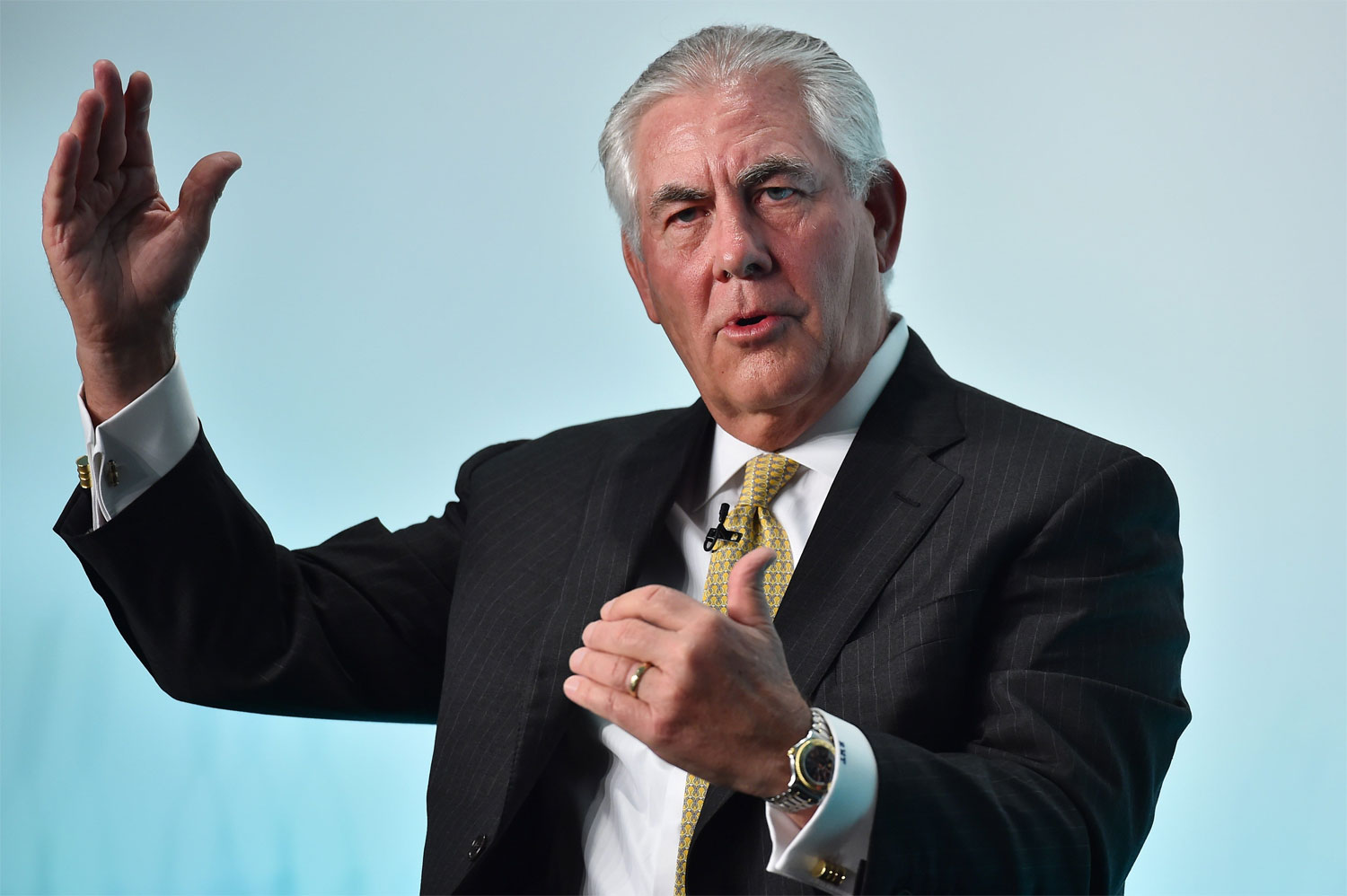
Responsibilities: The secretary of state advises and carries out the President's foreign policies. As America's chief representative to the world, it's the highest-ranking cabinet position and is fourth in line to succeed the president. This position requires Senate confirmation.
Background: Tillerson, 64, is the CEO of energy giant ExxonMobil, a role he's held since 2006. As the company's top executive, he's traveled the world and negotiated with its leaders. During his tenure, ExxonMobil has acknowledged the science of climate change—Tillerson has called it a "real" and "serious" threat, and his company supports the Paris climate accord.
He also supported Jeb Bush for president, The Washington Post noted.
A native Texan, Tillerson was president of the Boy Scouts of America from 2010 to 2012, when the organization shifted its policy to allow openly gay young men to join, according to the Dallas Morning News.
Why he's controversial: Although Tillerson works with world leaders on behalf of ExxonMobil, he has no background in diplomacy. His appointment marks the first time in modern history that a secretary of state has no experience in the public sector, according to The Washington Post.
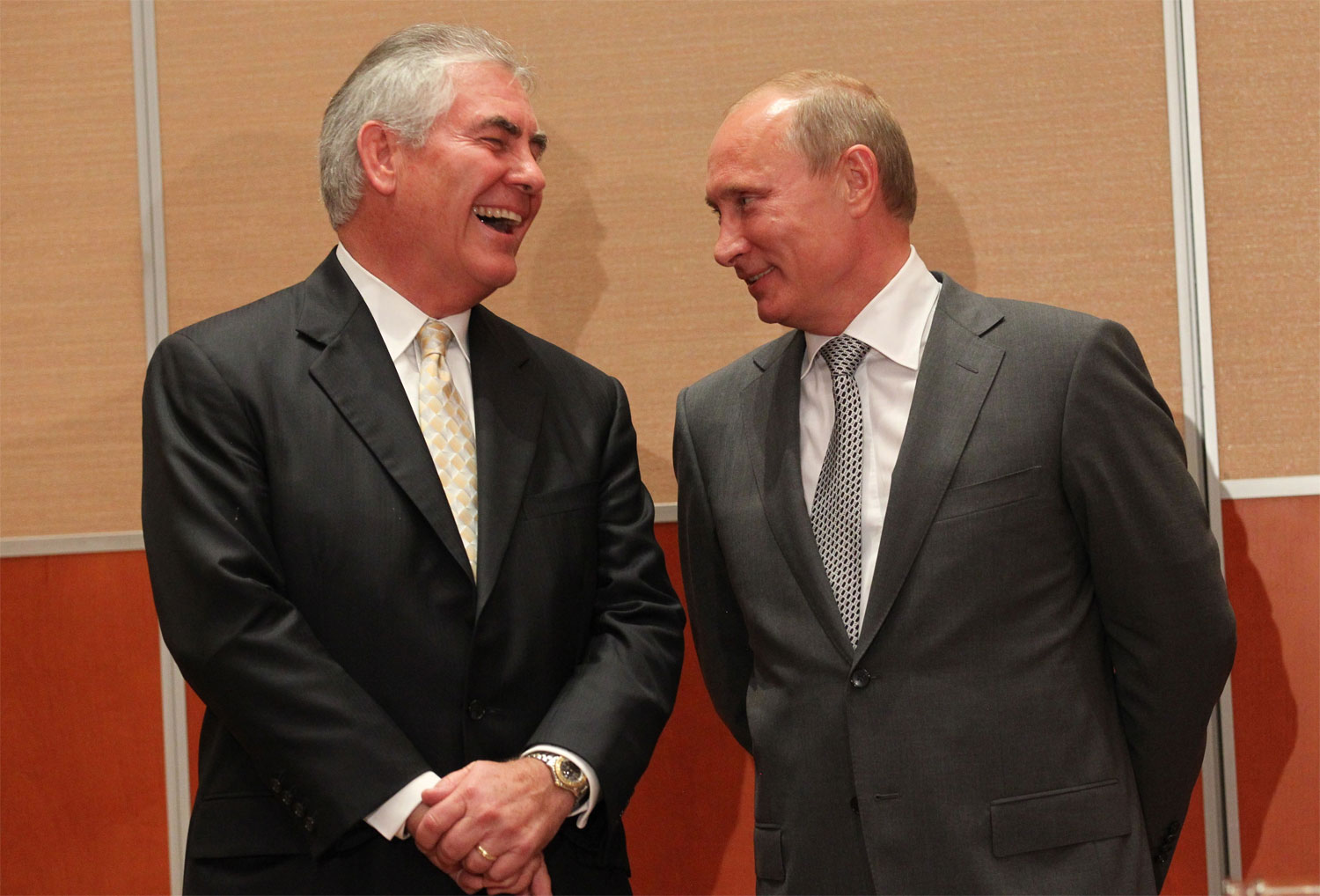
Rex Tillerson with Vladimir Putin in 2011
Tillerson has a number of business entanglements because of his work around the globe. His most troubling relationship is with Russian President Vladimir Putin, who, according to The New York Times, he has known for more than 20 years. In fact, Russia even awarded Tillerson its official Order of Friendship. U.S. sanctions against Russia, which were put in place in 2014 when Russia annexed Crimea, have cost ExxonMobil more than $1 billion. As secretary of state, Tillerson would hold sway over those sanctions.
Tillerson's foreign-policy views are also largely unknown. He is, however, a proponent of free trade, according to The Wall Street Journal—a major campaign issue that Trump rallied his supporters against. "Energy made in America is not as important as energy simply made wherever it is most economic," Tillerson said in 2007 in a speech to the Council on Foreign Relations. It's unclear how Trump's supporters would react to a secretary of state who's so strongly in favor of free trade.
Gary Cohn: National Economic Council Director
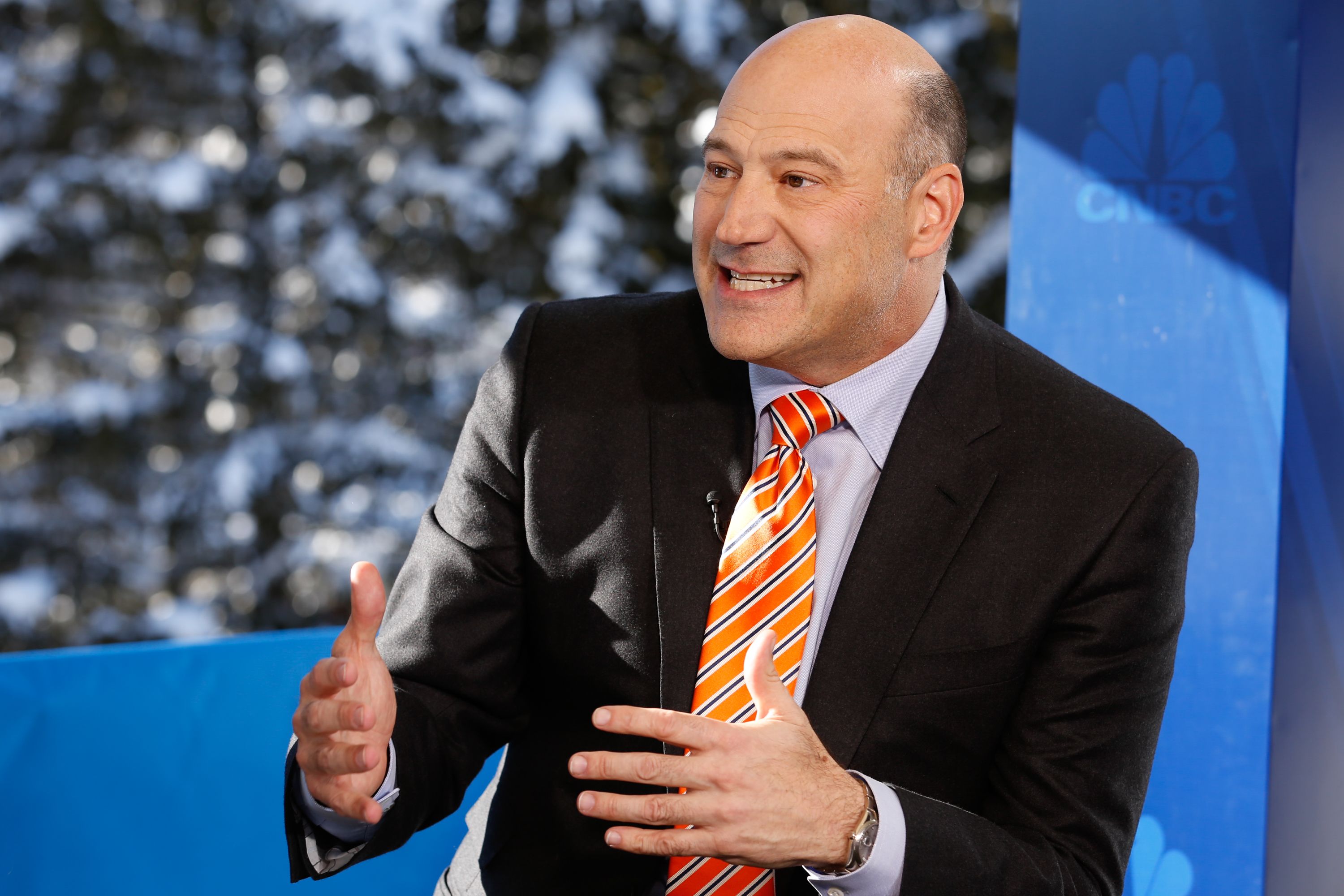
Responsibilities: The National Economic Council Director advises the President on U.S. and global economic policy. This position resides within the Office of Policy Development and is part of the Executive Office of the President. It does not require Senate confirmation.
Background: Cohn, 56, is president of Goldman Sachs and COO, and is a former Goldman commodities trader from Ohio who joined the firm in 1990. He held various leadership roles including bond trading, becoming co-head of Goldman's broader securities and co-President in 2006.
Why he's controversial: Trump repeatedly attacked Goldman saying there's evidence that corporate and financial interests influence politicians and criticized Ted Cruz for taking a loan from them, as well as Clinton's ties to Goldman Sachs and other Wall Street firms. This is the third time Trump has tapped an alum of a major investment bank for a senior role in his administration—Cohn joins Mnuchin and Bannon, both Goldman Sachs' alums.
Linda McMahon: Head of the Small Business Administration (CONFIRMED)
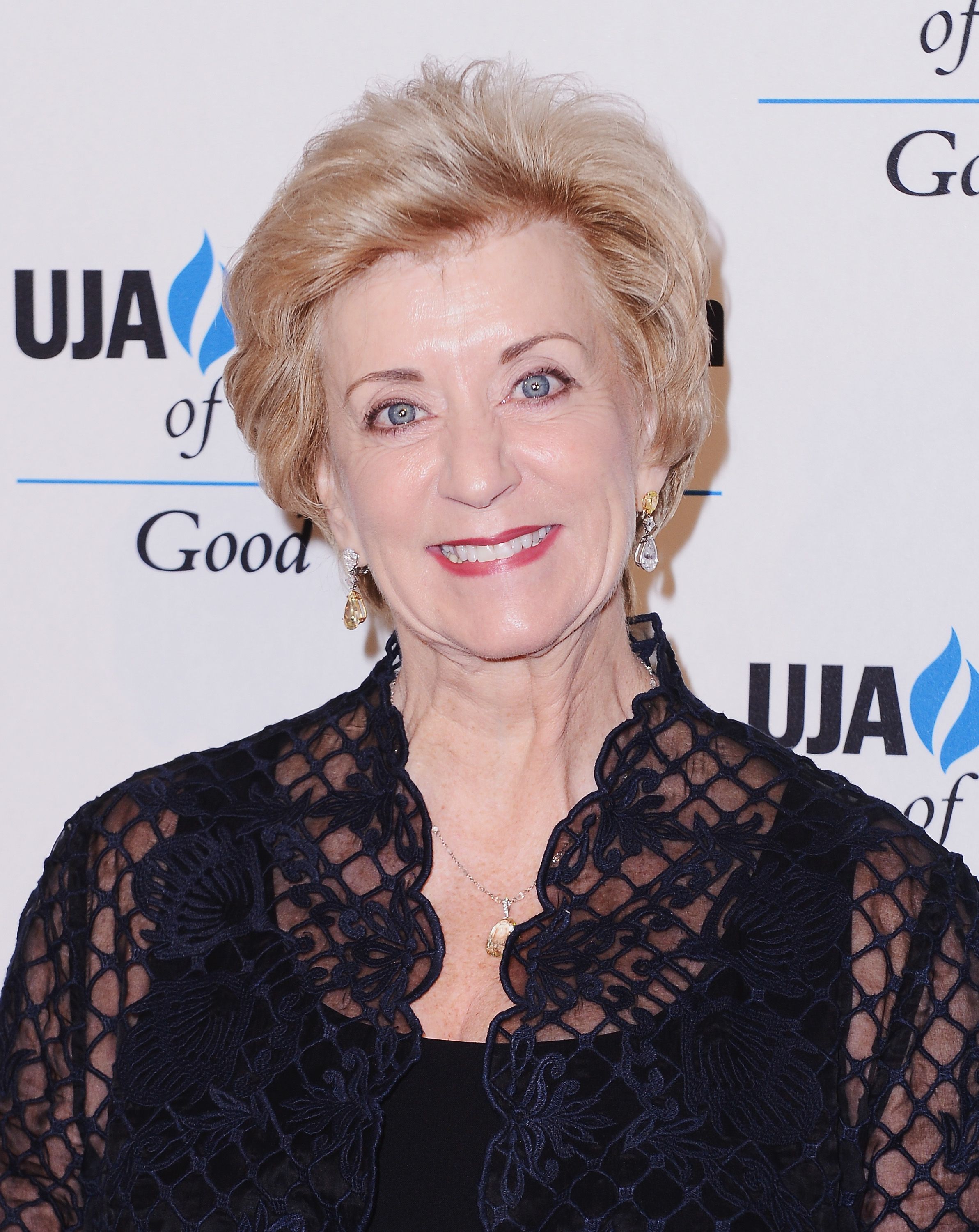
Responsibilities: The Small Business Association, or SBA, supports small American businesses by extending loans and ensuring these companies get a percentage of federal contracts. There is at least one SBA office in every state. This position requires Senate approval.
Background: McMahon, 68, is the co-founder and former CEO of the wrestling franchise WWE, a $650 million publicly traded company. Her husband, Vince McMahon, is the other co-founder (and current CEO). Both have known Trump for 30 years. He frequently appeared at WWE events and was inducted in the WWE Hall of Fame in 2013.
McMahon stepped down as the company's chief executive officer in 2009 and began a start-up to encourage more women business owners. She also ran unsuccessfully for Senate twice, spending $100 million of her own money on the campaigns.
During the presidential primary, McMahon criticized Trump for his comments about women. "He's not helping, certainly, to put women in the best light," she said. After the primaries, however, she committed to Trump, although she also admitted he wasn't her first choice for the Republican nomination.
Why she's controversial: McMahon is a billionaire, reinforcing the Trump administration's standing as the wealthiest White House in modern history. She also donated $6 million earlier this year to a super PAC supporting Trump, according to CNN, and between 2007 and 2009, she and her husband donated $5 million to the Trump Foundation, according to The Washington Post. The Trump Foundation is a charity that's come under fire for using funds to pay for personal expenses, like lawsuit settlements and portraits of Trump.
James Mattis: Secretary of Defense (CONFIRMED)
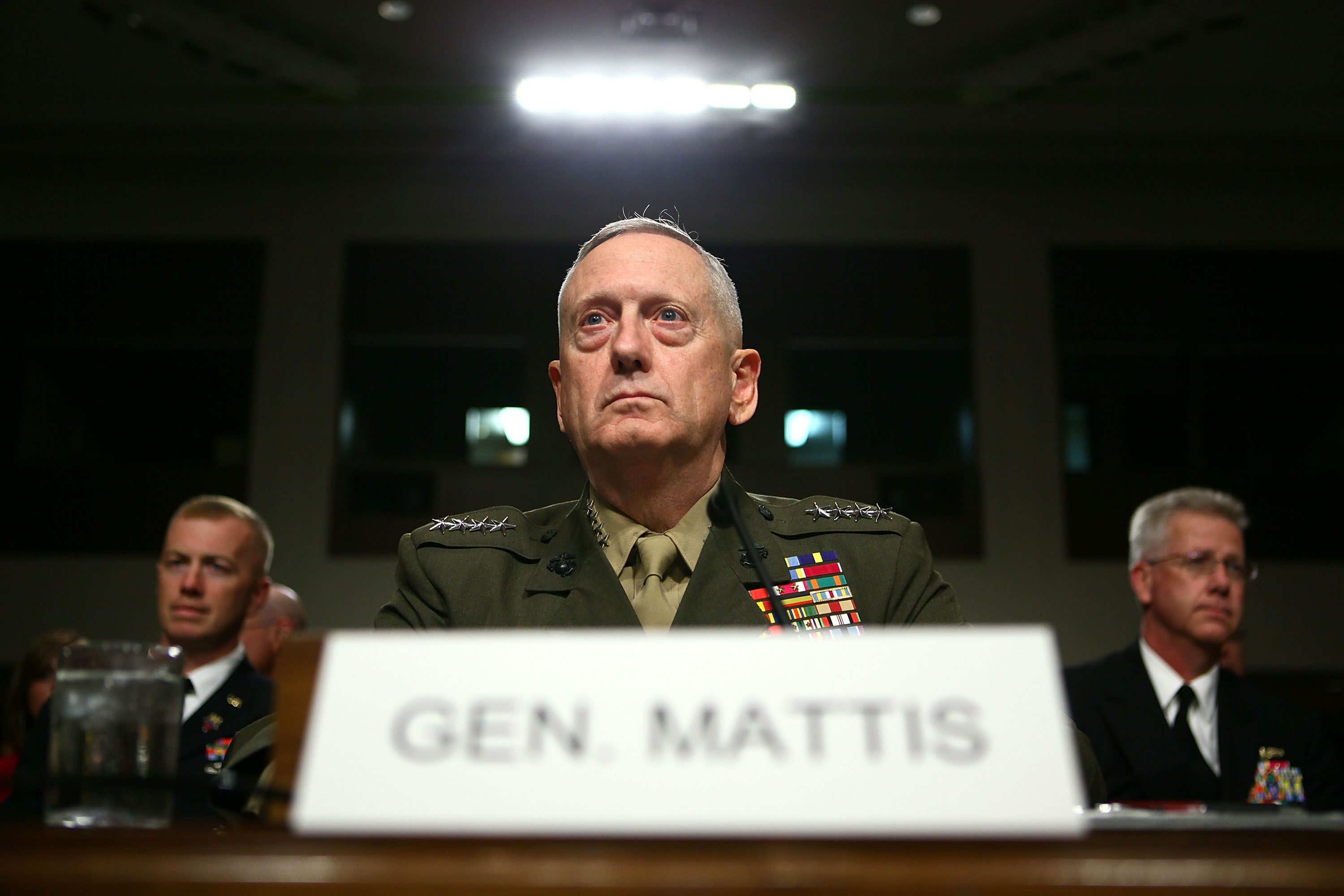
Responsibilities: The defense secretary oversees the U.S. military, comprised of the Army, Navy, Marine Corps, and Air Force. The only person with a higher degree of authority over the military is the president. This position requires Senate approval.
Background: Mattis, 66, is a retired Marine Corps general who The Washington Post called "one of the most influential military leaders of his generation." He led U.S. Marine raids in Afghanistan in 2001 and commanded a division of Marines during the 2003 invasion of Iraq. In 2004, he led Marines in the ferocious battle to take the Iraqi city of Fallujah. Mattis, whose nicknames include "Mad Dog" and the "Warrior Monk," retired as head of U.S. Central Command in 2013. That position oversees military operations in the Middle East and Southwest Asia.
Why he's controversial: Mattis, a critic of the Obama administration, shares Trump's position on taking a stronger approach against America's enemies, particularly Iran, according to The Washington Post. He also sees "political Islam" as a significant threat and, according to The New York Times, is cavalier with some of his public statements. In 2005, for instance, he said:
But he also differs from Trump on key issues, including Russia, disagreeing with Trump's glowing reviews of Russian President Vladimir Putin, according to the Times. And Mattis doesn't think the U.S. should tear up the Iran nuclear deal, as Trump has suggested.
Mattis will need Congress to pass special legislation to gain confirmation, which lawmakers did ahead of his confirmation on January 20. Right now, defense secretaries must not have served on active military duty in the past seven years. The last former general to hold the defense secretary post was George Marshal in 1950.
Steven Mnuchin: Secretary of the Treasury (CONFIRMED)
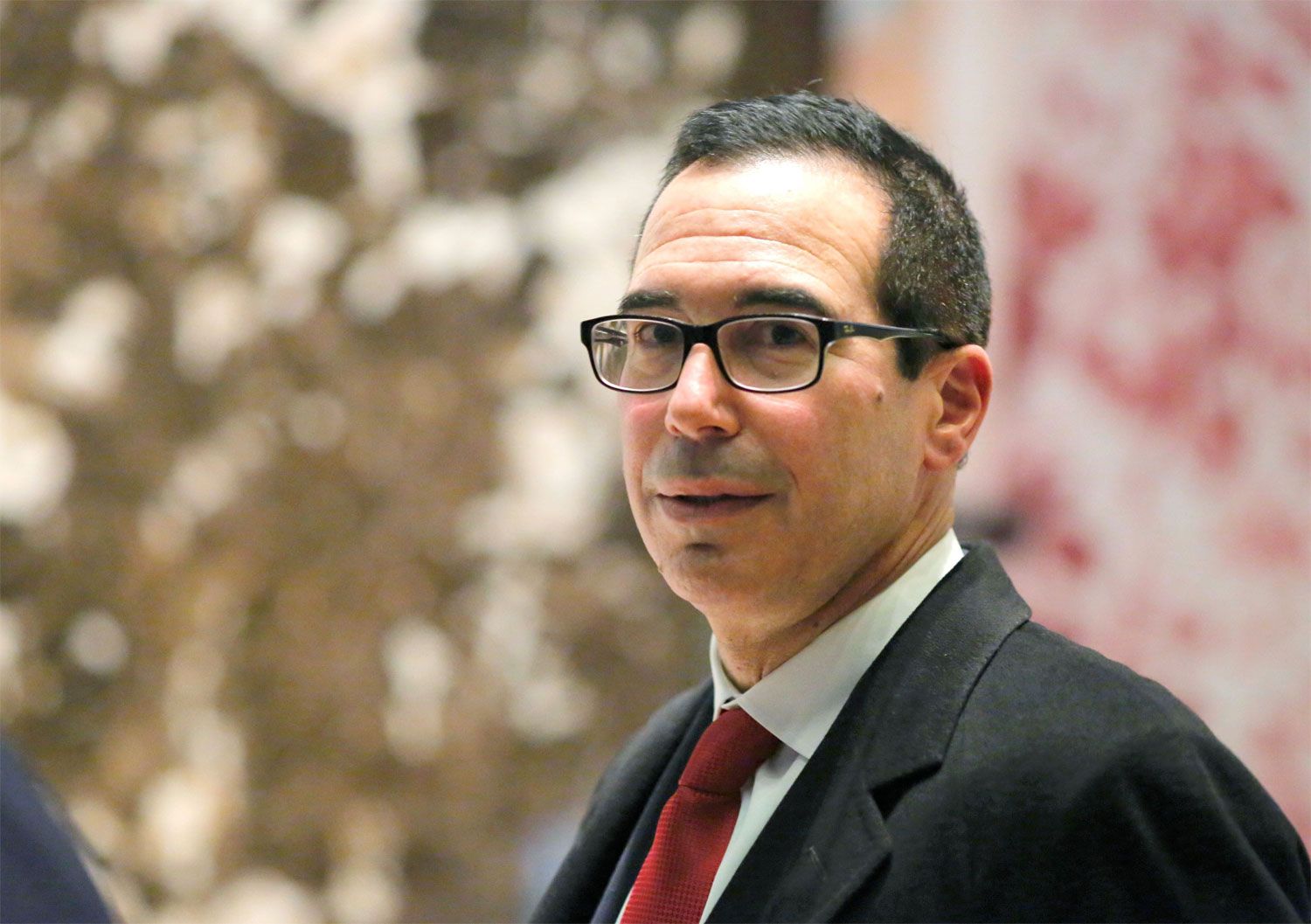
Responsibilities: The treasury secretary oversees the country's tax system—including the IRS—borrows money on behalf of the government, and handles financial sanctions against foreign countries that are enemies of the U.S. This position requires Senate approval.
Background: The 53-year-old—whose name is pronounced mi-new-chin—was the national finance chairman for Trump's campaign. His career started at Goldman Sachs, where he rose to partner, then he went on to start a hedge fund on the West Coast, where, according to The New York Times, he financed movies like the X-Men franchise and Avatar.
Why he's controversial: Although Mnuchin spent his career in finance and is hailed as a "financial expert" by Trump insiders, he has no experience in government. Liberal groups have also expressed concern over Mnuchin's business dealings during the 2008 financial crisis. He was chairman of a mortgage company that was accused of improperly foreclosing on homeowners, according to the Times.
"He purchased a bailed-out bank for pennies on the dollar and then aggressively foreclosed on tens of thousands of families," Jon Green, a spokesman for the Take On Wall Street campaign, said in a statement. "Anyone concerned about Wall Street billionaires rigging the economy should be terrified by the prospect of a Treasury Secretary Mnuchin."
Jeff Sessions: Attorney General (CONFIRMED)
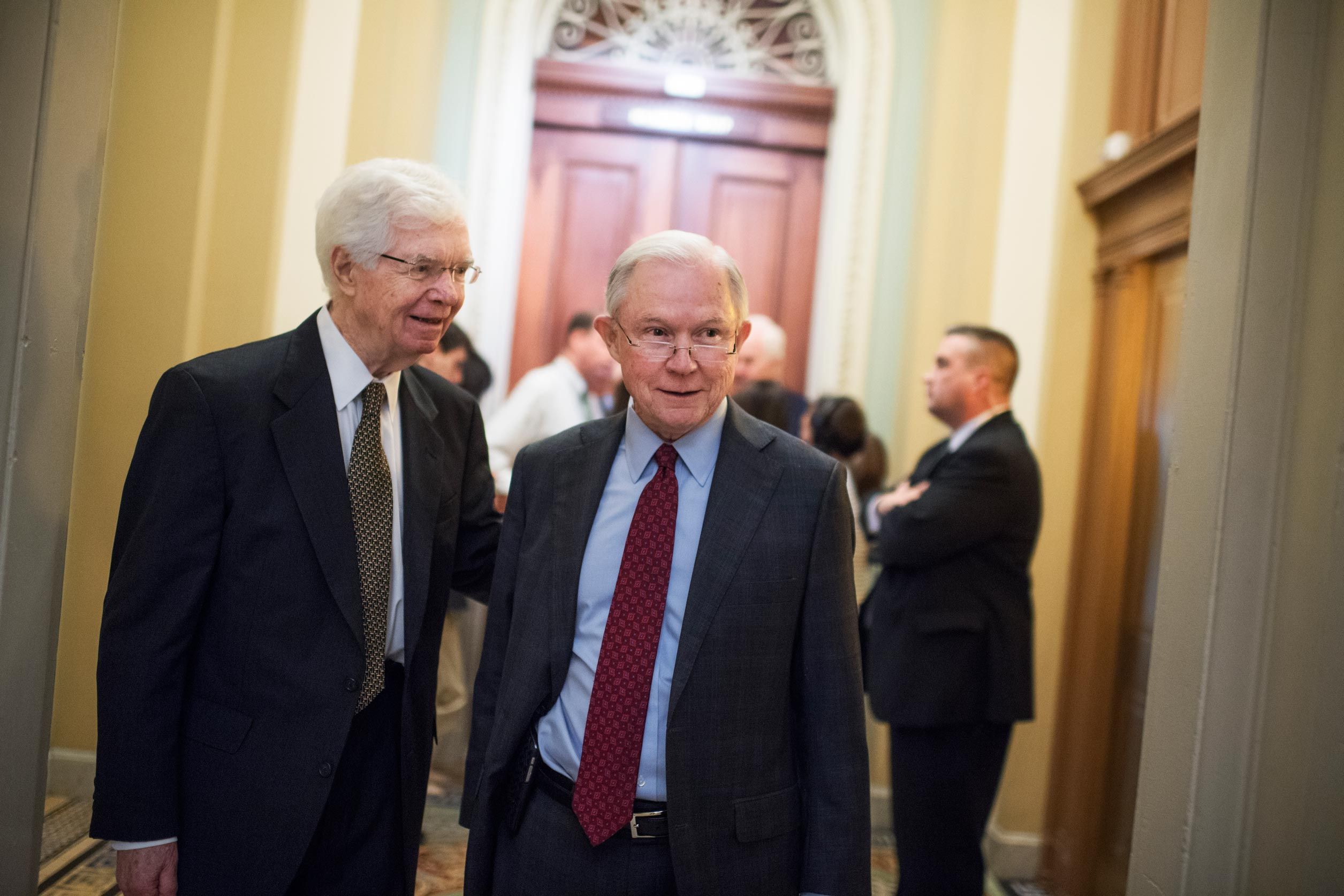
Responsibilities: The attorney general is America's top law enforcement official and top lawyer. The person in this position can, according to The New York Times, "change how civil rights laws are enforced." This position requires Senate approval.
Background: Sessions, 70, is the junior senator from Alabama, a role he's held for the past 20 years. In February 2016, Sessions became the first sitting U.S. Senator to support Trump for president.
Why he's controversial: Sessions has, according to his former colleagues as reported by NPR, made a number of racist comments:
The NAACP has consistently given Sessions an "F" on his legislative scorecard. The Nation called hm "a leading voice for the Old South and the conservative white backlash vote."
Sessions is also a hardliner on immigration, earning a reputation, according to NPR, as the most vocal opponent to immigration reform in the Senate. "He opposes a path to legal citizenship for immigrants in the U.S. illegally, backs Trump's plan for a wall, and even supports limiting legal immigration in order to protect American jobs," NPR reported.
Betsy DeVos: Secretary of Education (CONFIRMED)
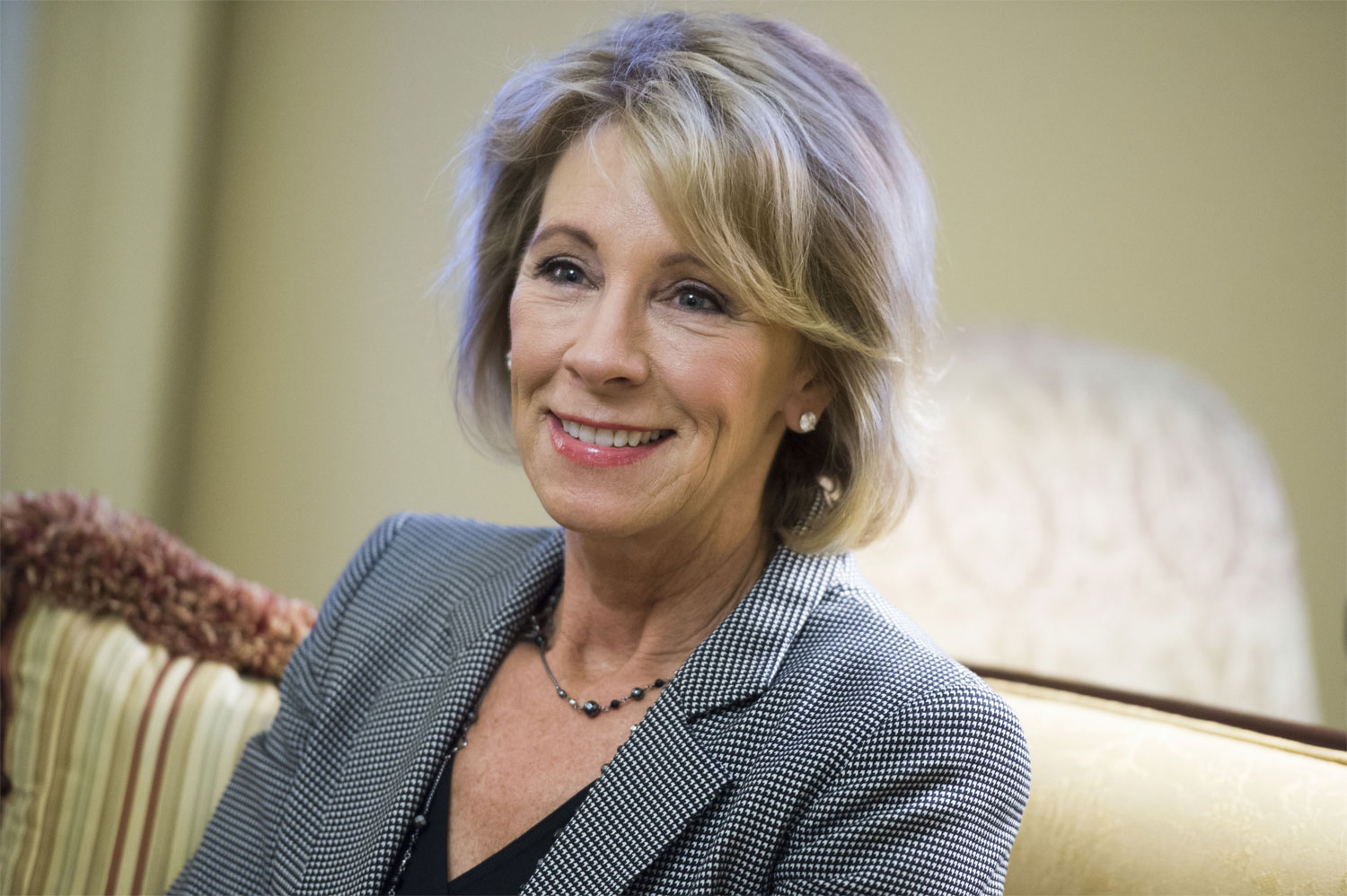
Responsibilities: The education secretary oversees the nation's education system, including proposing and enacting public policy. This position requires Senate approval.
Background: DeVos, 58, is a billionaire businesswoman who chairs a company called the Windquest Group that invests in technology, manufacturing, and clean energy. Her nonprofit work is extensive, particularly in the field of education, where she's raised money for charter schools. She's also a high-profile Republican fundraiser and held prominent roles in the Michigan Republican Party, including chairwoman from 1996 to 2000.
Why she's controversial: Public school unions are furious over DeVos' appointment. Randi Weingarten, the head of one of the nation's largest teachers' unions, called her the "most ideological, anti-public education nominee" since the development of the department. As a staunch proponent of charter schools, DeVos has sought to steer money away from public schools and into private and parochial schools, according to Kary Moss, executive director of the American Civil Liberties Union of Michigan.
Chalkbeat, which covers education news, reported that DeVos and her husband spent nearly $1.5 million to prevent Michigan from adding oversight to charter schools. According to The Altantic, the NAACP has pointed out that low-income children and children of color suffer from this kind of deregulation. The measure was defeated in Michigan.
Elaine Chao: Secretary of Transportation (CONFIRMED)
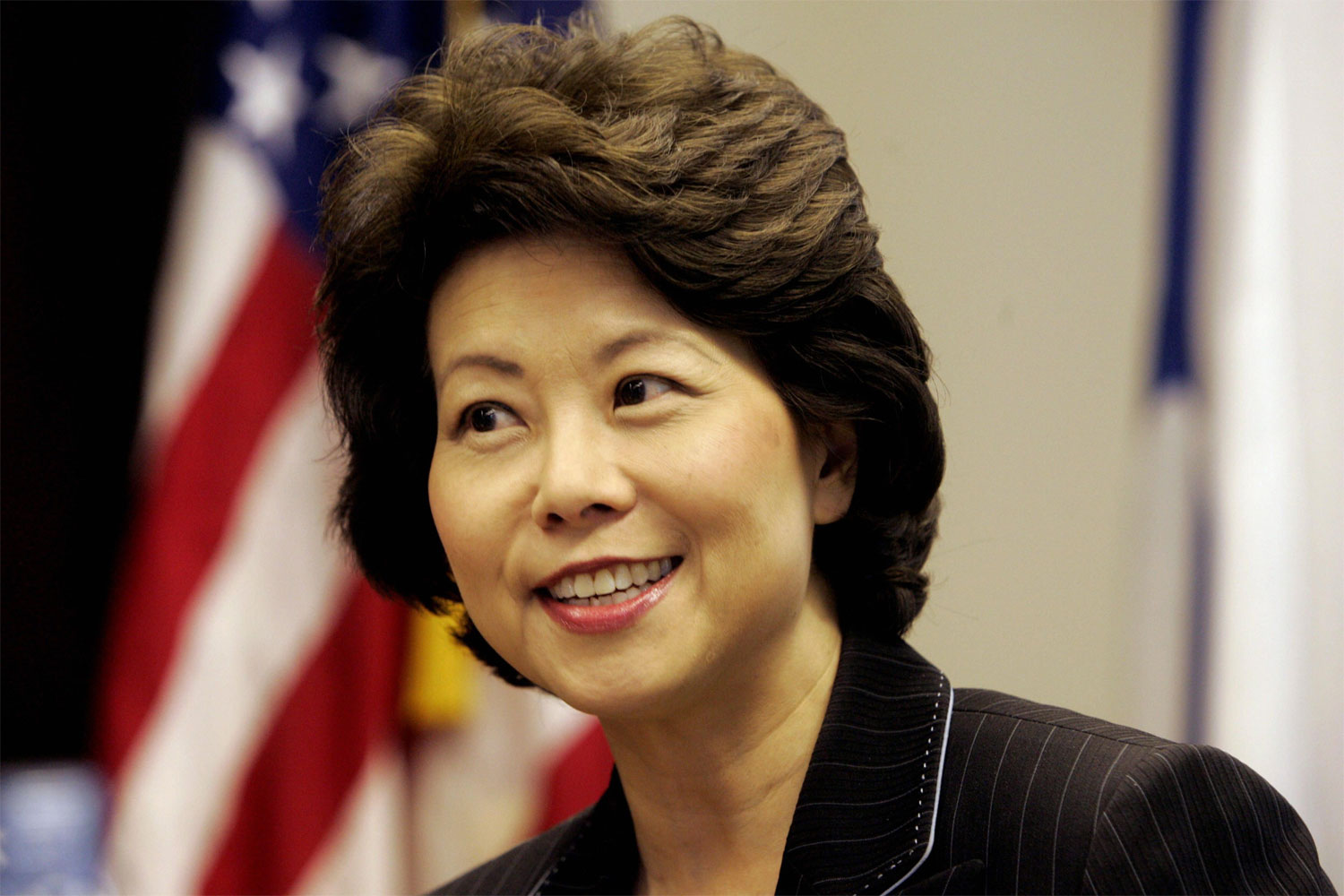
Responsibilities: The transportation secretary oversees the nation's roads, airports, and railways, including the Federal Aviation Administration, the Federal Highway Administration, the Federal Railroad Administration. This position requires Senate approval.
Background: Chao, 63, is well versed when it comes to Washington, having worked in three Republican White Houses. She was Secretary of Labor under George W. Bush for eight years, making her the only cabinet member to serve his entire term. Under George H.W. Bush, she was director of the Peace Corps and then deputy transportation secretary. And, in the Reagan administration, she was a White House fellow.
Chao's extensive experience and connections will serve Trump well in enacting his ambitious infrastructure plan, which includes overhauling roads, bridges and airports.
Chao, who is married to Senate Majority Leader Mitch McConnell, brings some diversity to Trump's cabinet. She was born in Taiwan and moved to the U.S. with her family at the age of eight.
Why she's controversial: As labor secretary, her department was criticized for favoring business and ignoring worker safety, according to The New York Times. But Chao is among the least controversial of Trump's choices to date.
Tom Price: Secretary of Health and Human Services (CONFIRMED)
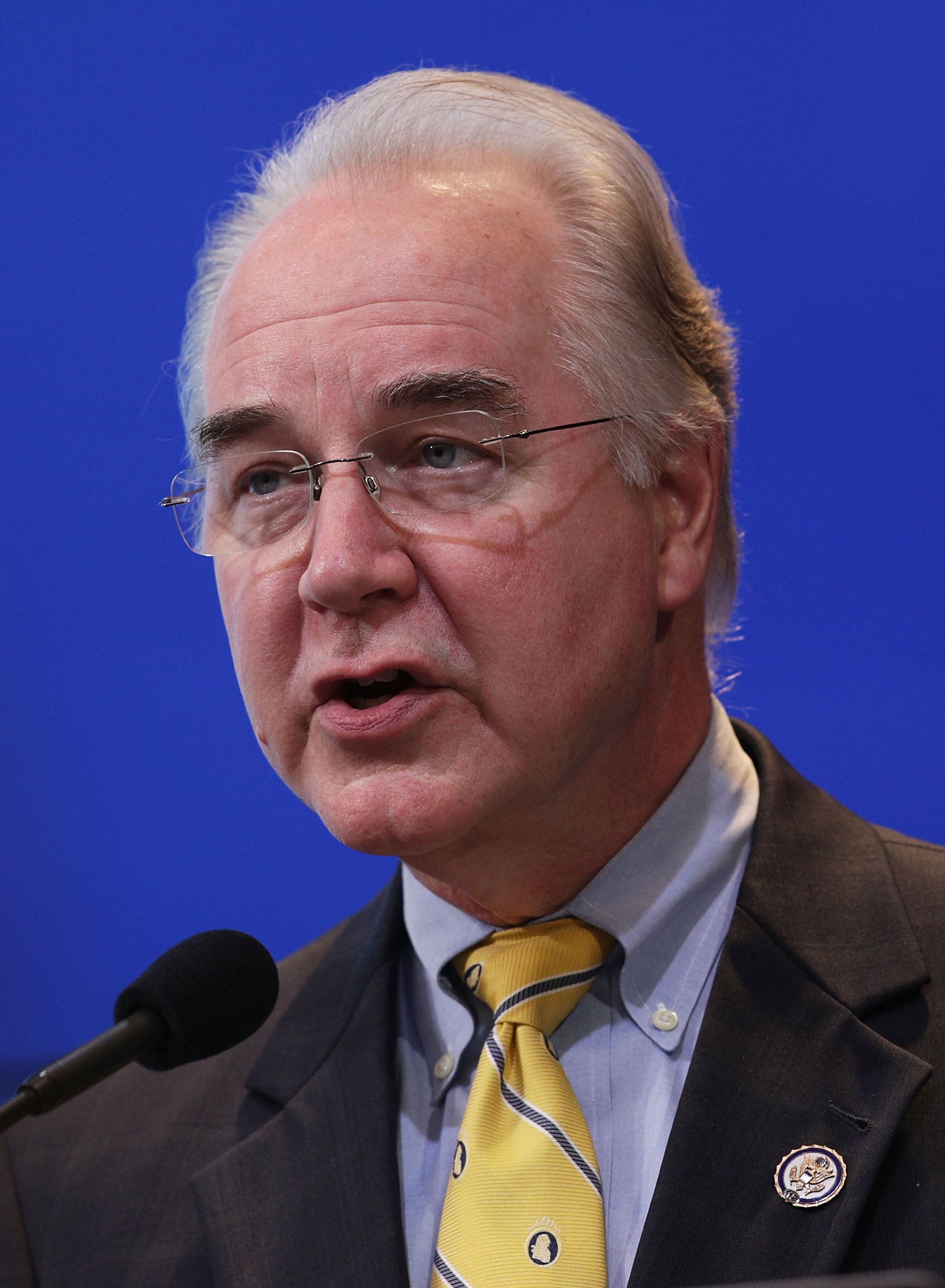
His responsibilities: The secretary of health and human services oversees a sprawling $1-trillion department that includes Medicare and Medicaid, the Affordable Care Act, the Centers for Disease Control, and regulations over the nation's food and drugs. This position requires Senate approval.
Background: A Republican congressman from Georgia, Price, 62, has served in the House of Representatives since 2005. He was also an orthopedic surgeon. In congress, Price has earned a reputation as the leading voice to repeal the Affordable Care Act, known as Obamacare, drafting multiple bills meant to replace it.
Why he's controversial: Price will be instrumental in carrying out Trump's pledge to repeal and replace Obamacare. But critics say his latest bill meant to replace the law could strike a blow to the roughly 20 million people insured under Obamacare, according to The Guardian. He's also staunchly pro-life and opposes funding for groups like Planned Parenthood, he's against the Obamacare mandate that provides free birth control, and he's against same-sex marriage.
"Tom Price poses a grave threat to women's health in this country," Cecile Richards, President of Planned Parenthood, said in a statement.
Steve Bannon: Chief Strategist and Senior Adviser
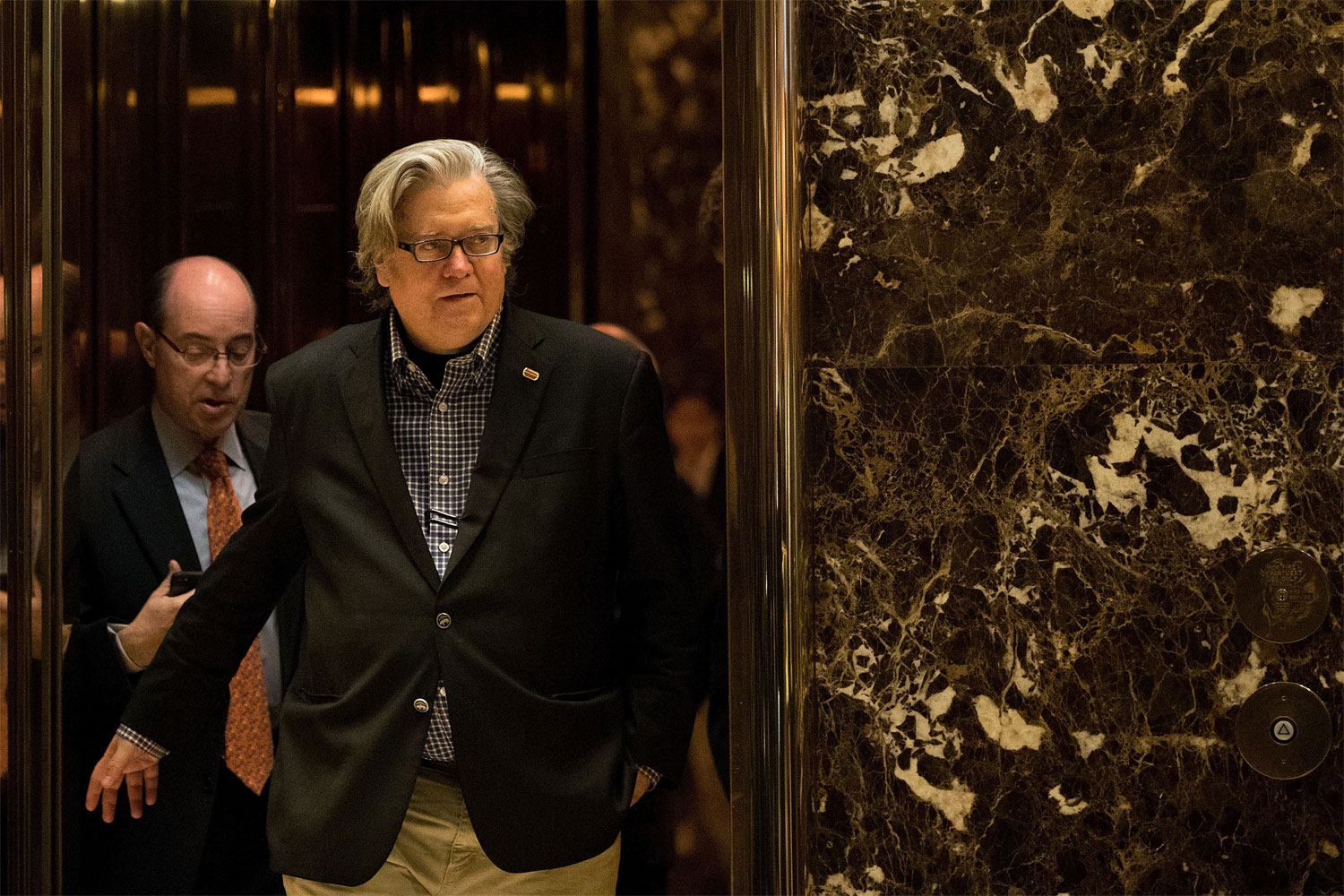
Responsibilities: Bannon and Priebus will work "as equal partners to transform the federal government," according to Trump's transition team. But The New York Times said Bannon, more than Priebus, "was better able to talk forcefully to the president-elect during difficult moments." This position does not require Senate approval.
Background: Bannon, 63, was the CEO of the Trump campaign in its final stretch. He is the former chairman of Breitbart News, a far-right-wing website that Bannon has called a "platform for the 'alt-right'." (The "alt-right" is a broad term for people who hold extreme conservative positions like white supremacy, anti-immigration, and anti-feminism.) He's also worked for Goldman Sachs before moving to Hollywood, where he directed documentaries about Ronald Reagan and Sarah Palin.
Why he's controversial: Where to begin? Bannon is arguably the most controversial of all of Trump's choices. He's seen as an extremist, having run a website that published "news" headlines like "Birth Control Makes Women Unattractive and Crazy" and "There's No Hiring Bias Against Women in Tech, They Just Suck at Interviews." He's been charged with domestic abuse by his ex-wife, although the charges were later dropped. She also accused Bannon of saying he didn't want his children to attend a particular school because of the number of Jewish students enrolled, a claim he has denied.
Bannon is also controversial because—as a Washington outsider—he's an unpredictable political operative. Not that he hasn't made his extreme positions known: "I'm a Leninist," he once told a writer at the Daily Beast. "Lenin wanted to destroy the state, and that's my goal, too. I want to bring everything crashing down, and destroy all of today's establishment."
His appointment sparked protests nationwide and strong condemnations from the Anti-Defamation League. "It is a sad day when a man who presided over the premiere website of the 'alt-right'—a loose-knit group of white nationalists and unabashed anti-Semites and racists—is slated to be a senior staff member in the 'people's house,'" the organization said in a statement.
Mike Pompeo: Director of the CIA (CONFIRMED)
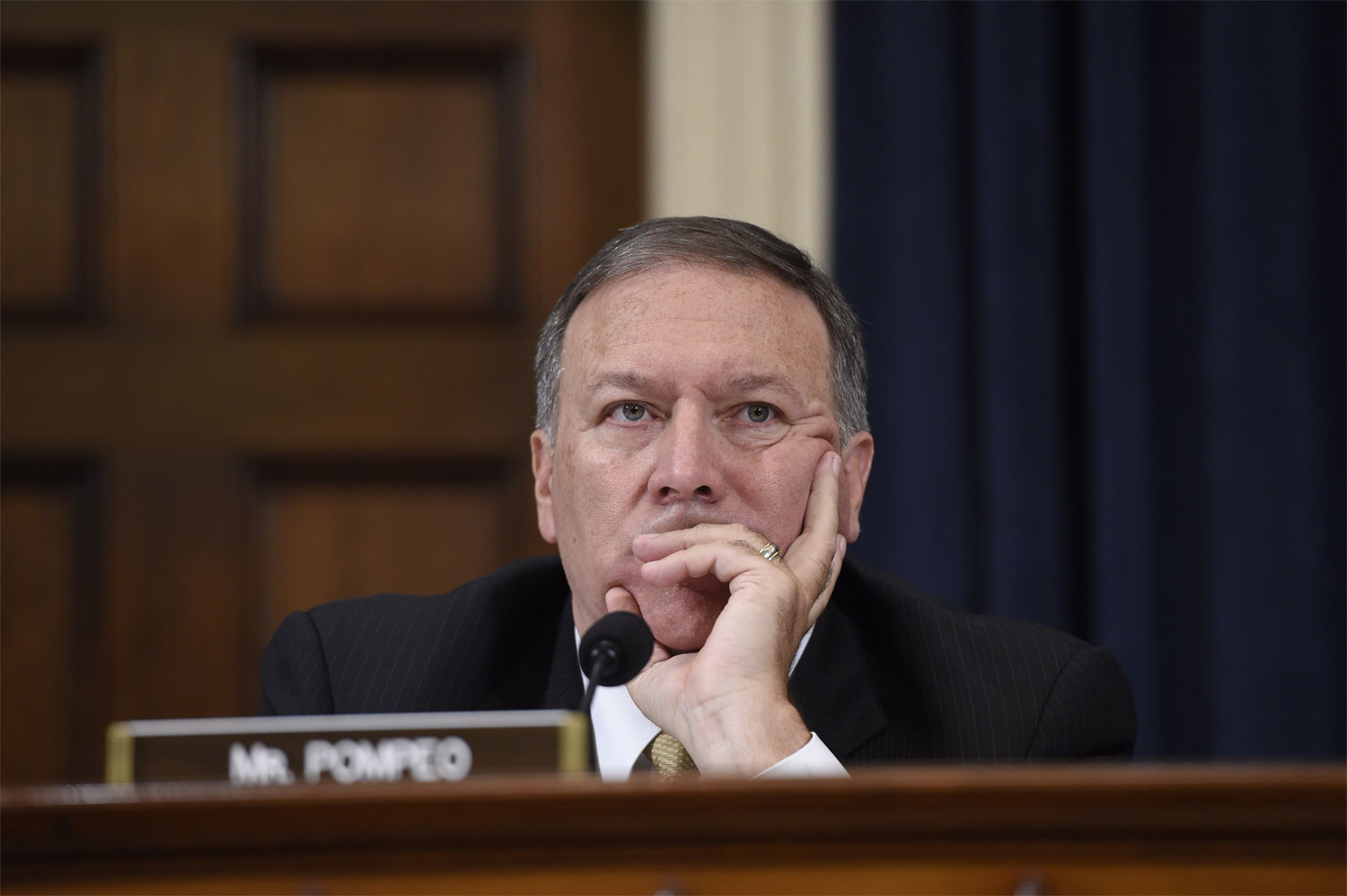
Responsibilities: The CIA director oversees the Central Intelligence Agency and reports to the Director of National Intelligence. This position requires Senate approval.
Background: A Republican congressman from Kansas, Pompeo, 52, has served in the House of Representatives since 2011, when he was swept into the office with the Tea Party movement. He's an Army veteran who spent years as a businessman before entering politics. In congress, Pompeo sits on the House Intelligence Committee, which has oversight of the CIA.
The Intelligence Committee investigated the 2012 attack on Americans in Benghazi, Libya, and, according to the New York Times, "found no new evidence of wrongdoing by the Obama administration" or then-Secretary of State Clinton." But Pompeo, who is a harsh critic of Clinton, was convinced there was a cover-up.
Why he's controversial: Pompeo has spoken out in the favor of the CIA's use of torture, which, according to a Senate report, included "waterboarding...the use of electric shocks, dogs, nudity, hypothermia, and mock executions." He supports government surveillance programs, like the NSA's mass collection of data from Americans' phone calls that ended in 2015, according to the Wichita Eagle. And he thinks Edward Snowden should be put to death.
Michael Flynn: National Security Adviser
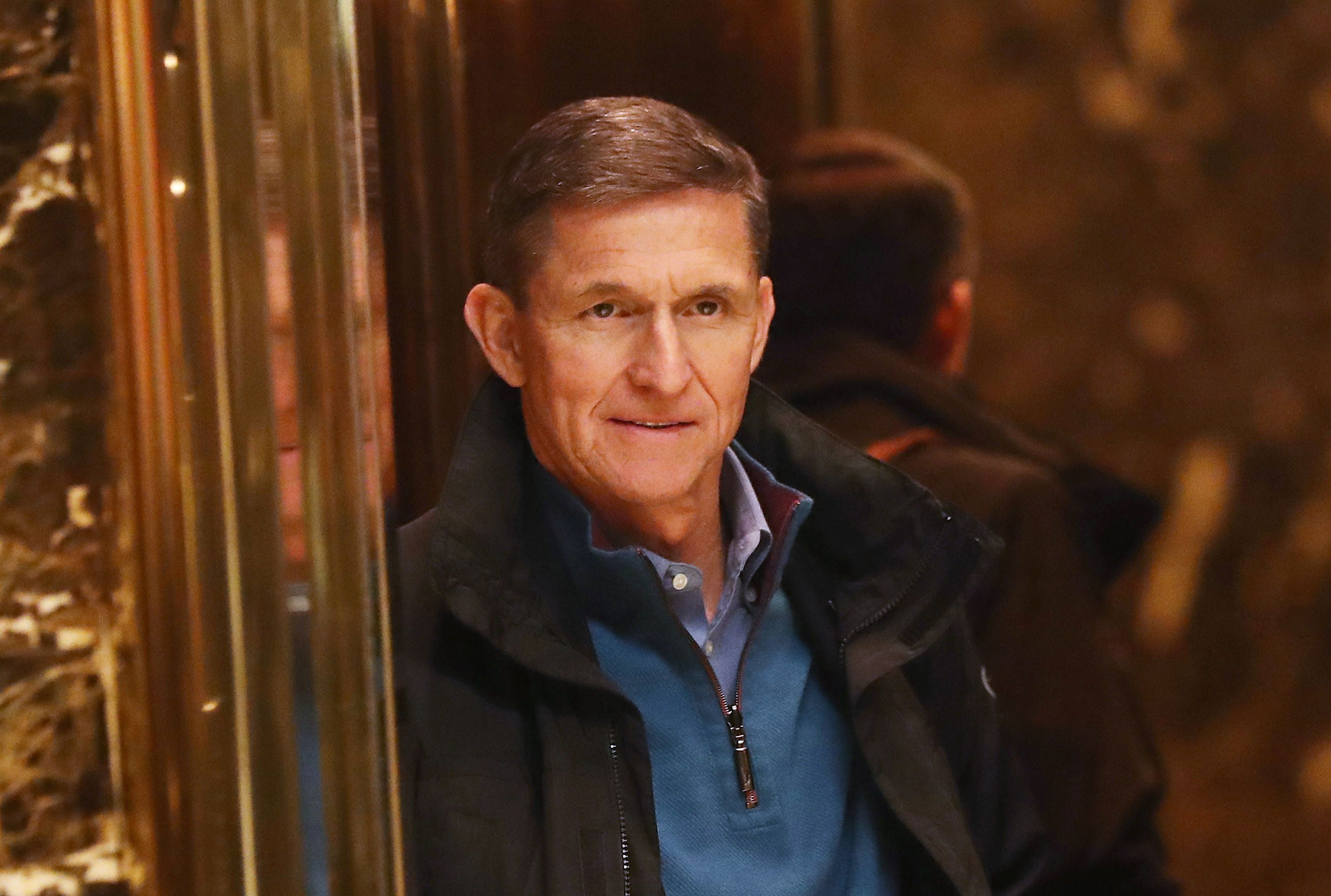
Responsibilities: The national security adviser is considered the president's top in-house counselor on matters of national security. The person in this role weighs in on policies from the departments of State and Defense. In the Trump administration, this role takes on even greater importance, according to The New York Times, because of Trump's lack of experience. This position does not require Senate approval.
Background: Flynn, 57, is a retired Army lieutenant general who served as Trump's primary national security adviser during his campaign. Flynn's greatest accomplishment, according to The New Yorker, was ramping up the frequency with which the military kills and captures suspected terrorists and insurgents. In 2012, Flynn became director of the Defense Intelligence Agency, which is the nation's highest-ranking military intelligence officer. He was fired in 2014 and soon began railing against Washington elite and the dangers of radical Islam.
Why he's controversial: Salon argues that Flynn is Trump's "scariest pick." His comments about the Muslim faith verge on Islamaphobia. He believes the greatest threat to America is "radical Islamic terrorism," according to The New York Times. "All else is secondary for General Flynn," the Times said. Flynn is also loose with his facts, and his colleagues in the military called his many false claims "Flynn facts."
During the Republican National Convention, Flynn led chants of "lock her up" directed at Hillary Clinton. He's also passed along outrageous lies about her, including, according to Salon, that Clinton was somehow involved in a pedophilia ring. Flynn has also praised Milo Yiannopoulos, a well-known internet troll who is considered a celebrity among the "alt-right."
Nikki Haley: United Nations Ambassador (CONFIRMED)
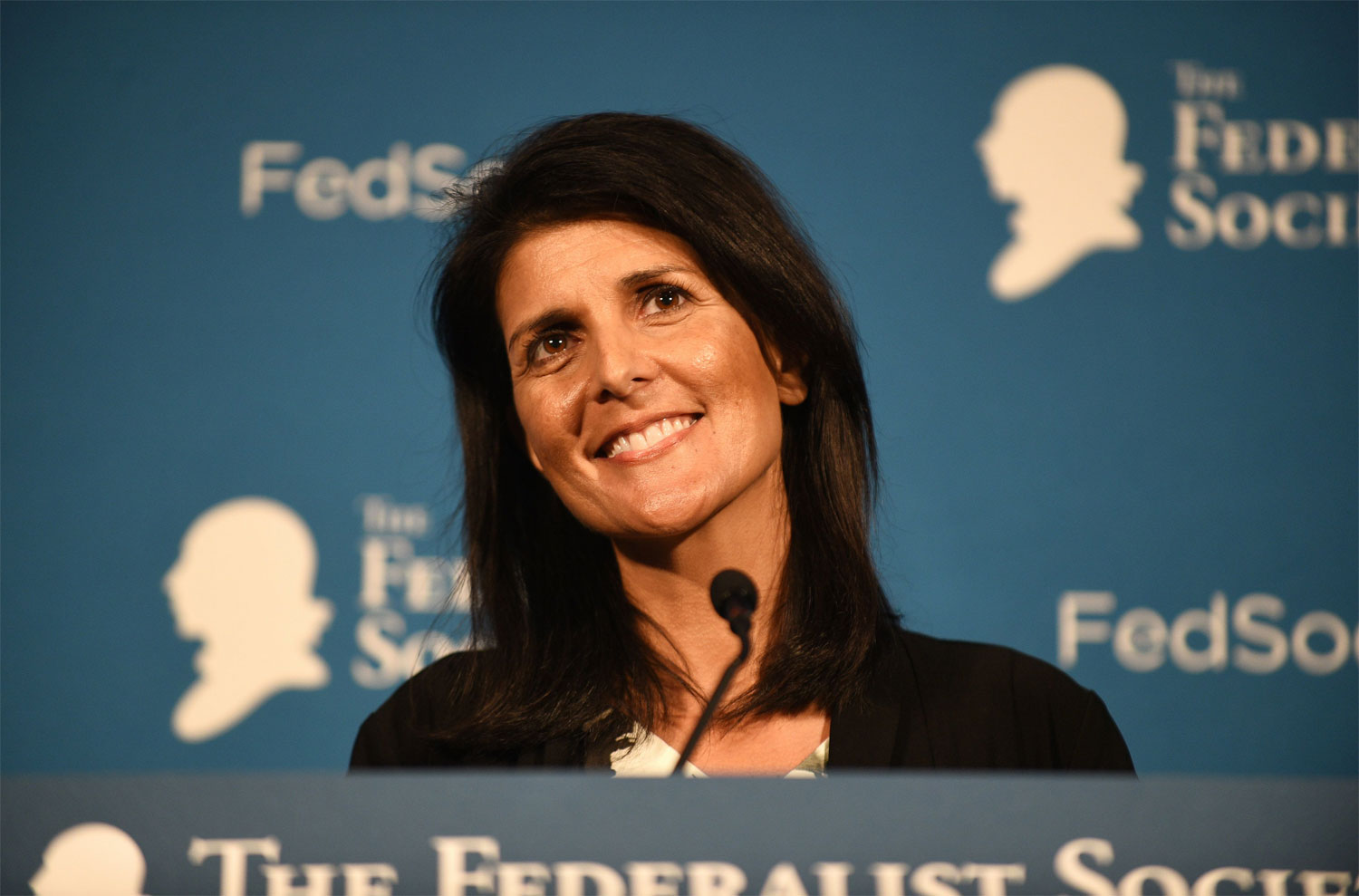
Responsibilities: The UN ambassador represents the United States at the Security Council and during most meetings of the General Assembly. The position is second only to the secretary of the state in being the face of America to the world. This position requires Senate approval.
Background: Haley, 44, is the governor of South Carolina, a role she's held since 2011. She is the first woman to hold the office in South Carolina and currently the youngest governor in the country. Prior to becoming governor, Haley served in the South Carolina House of Representatives. Haley earned praise for her response to a mass shooting at a black church in South Carolina in 2015, when she called for the Confederate battle flag to be removed from the state capitol.
Haley was also critical of Trump during the campaign and even drew a rebuke on Twitter from then-candidate Trump after she delivered the Republican response to Obama's State of the Union address in 2015. Haley called on Republicans to reject the "angriest voices," an obvious nod to Trump, who tweeted: "The people of South Carolina are embarrassed by Nikki Haley!"
She tweeted back: "Bless your heart."
The daughter of Indian immigrants, Haley was also critical of Trump's call to ban Muslims from the U.S., which she called "un-American."
Why she's controversial: Haley lacks foreign policy experience, and opposed the settlement of Syrian refugees in South Carolina. But she's seen as a rising star in the Republican Party and earned praise from Senator Tim Kaine who, according to Politico, said her experience as governor would serve her well in the new job.
With reporting from The Associated Press.
Follow Marie Claire on Facebook for the latest news, fascinating reads, livestream video, and more.